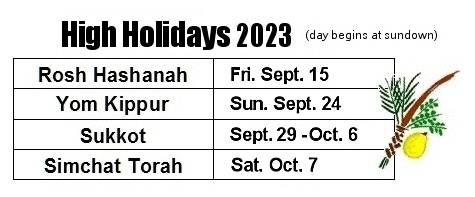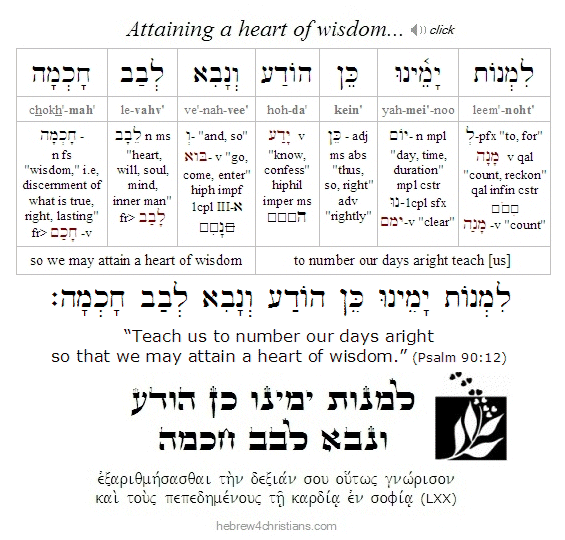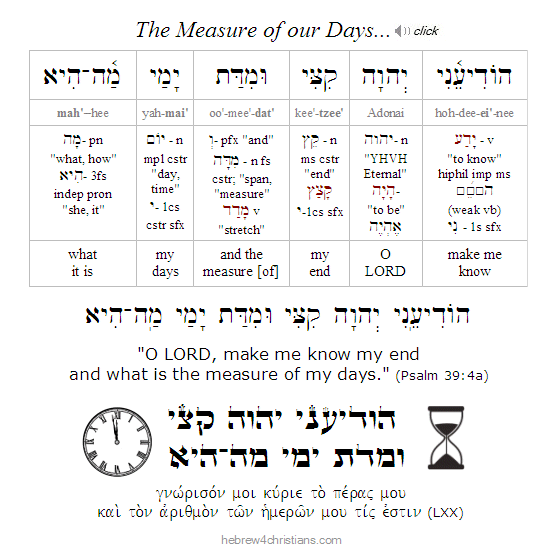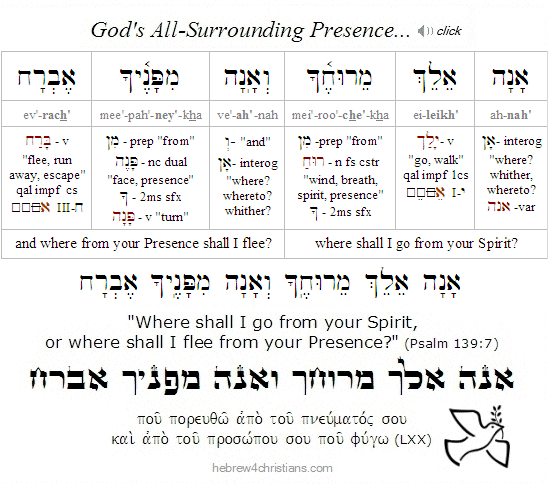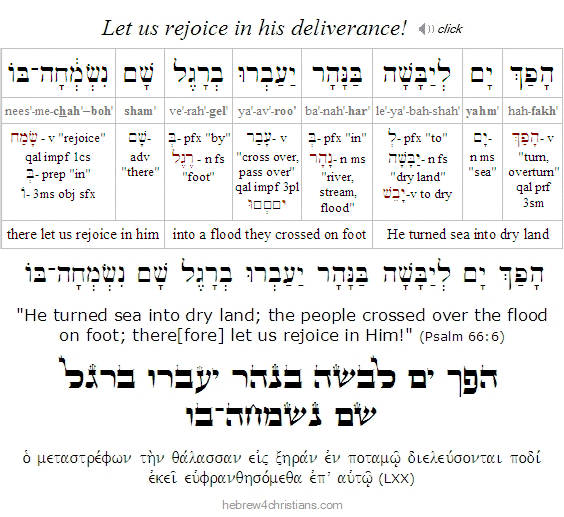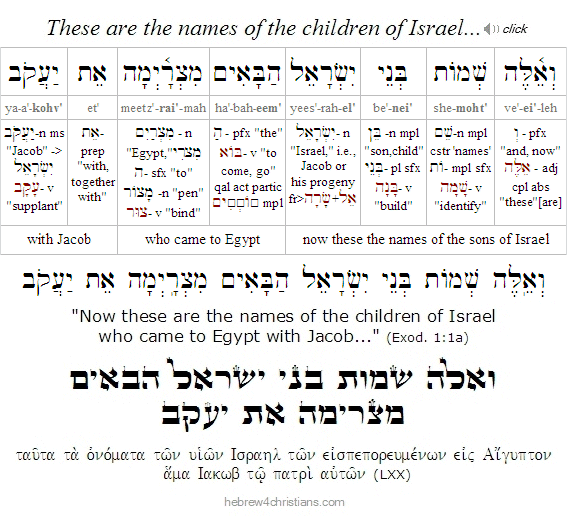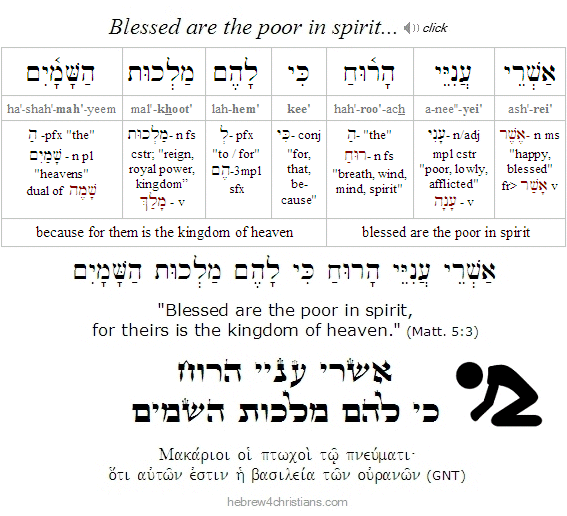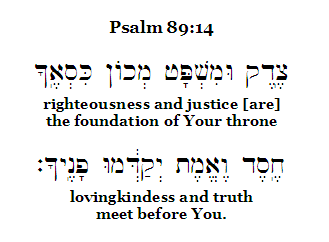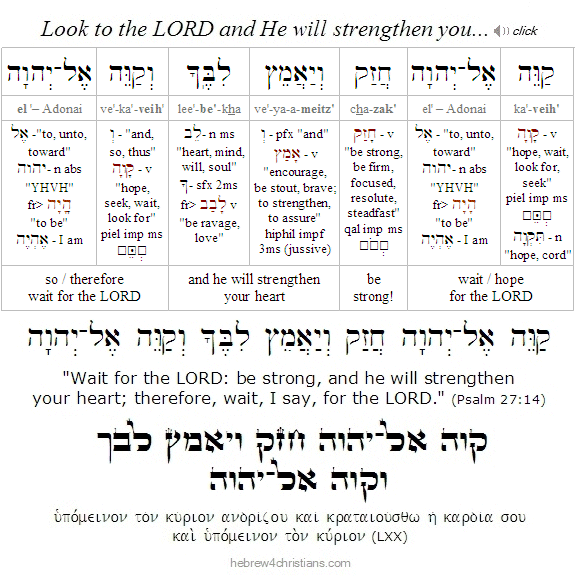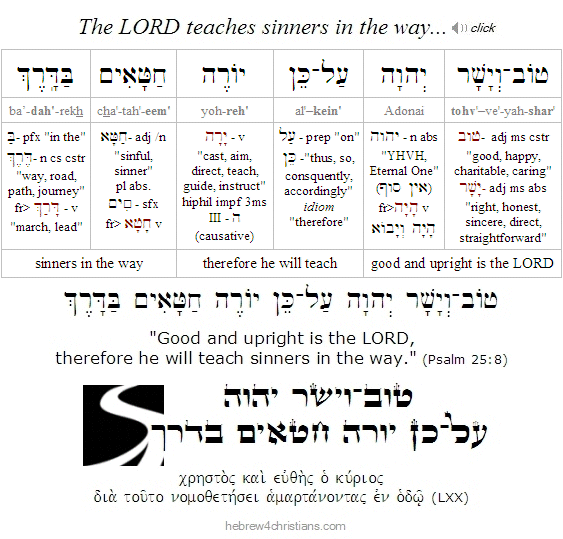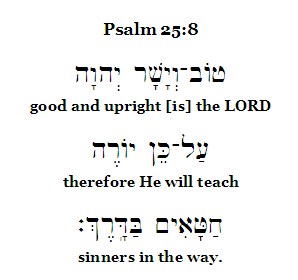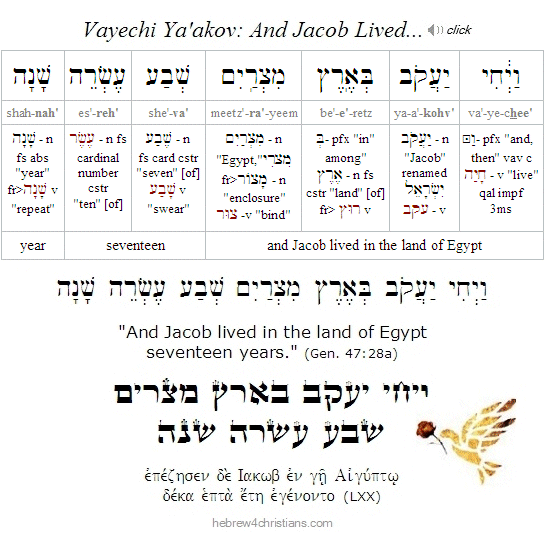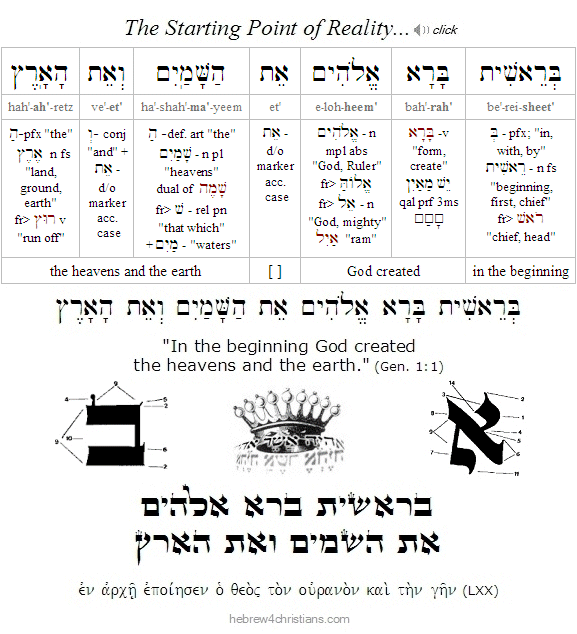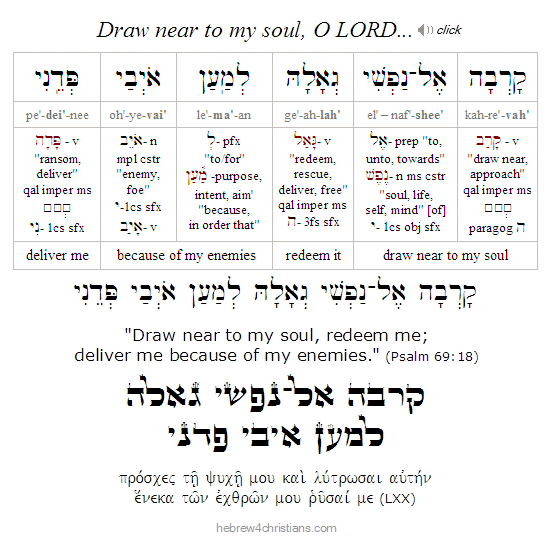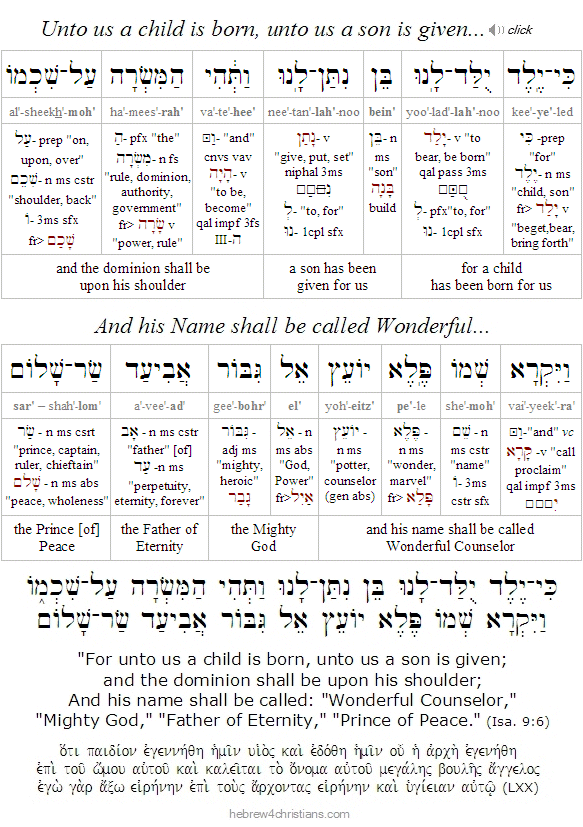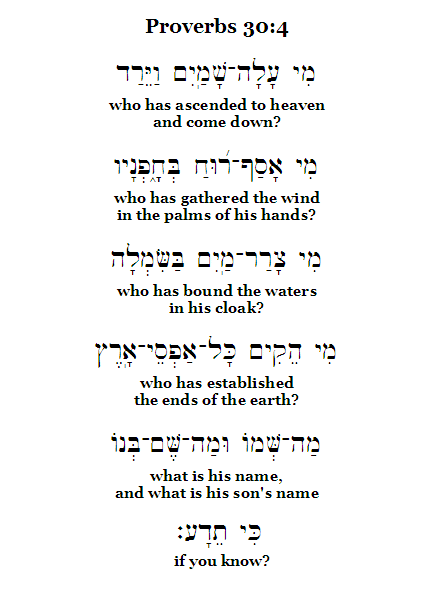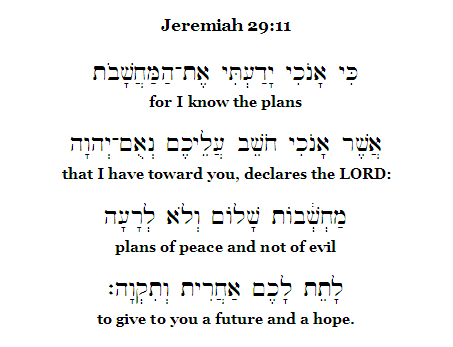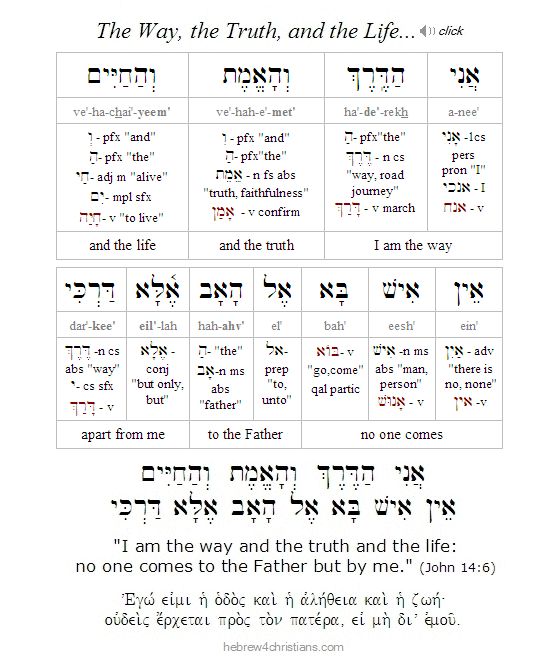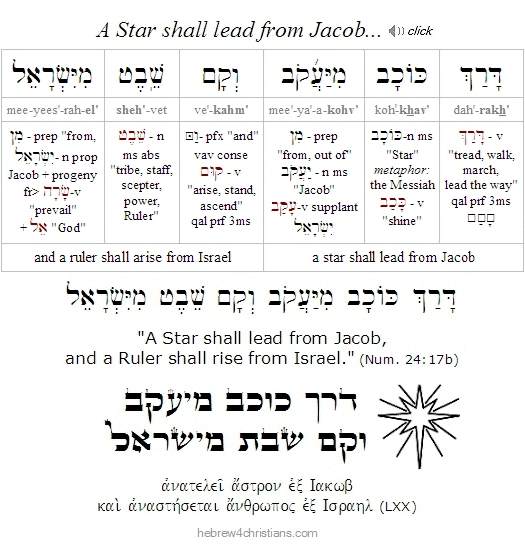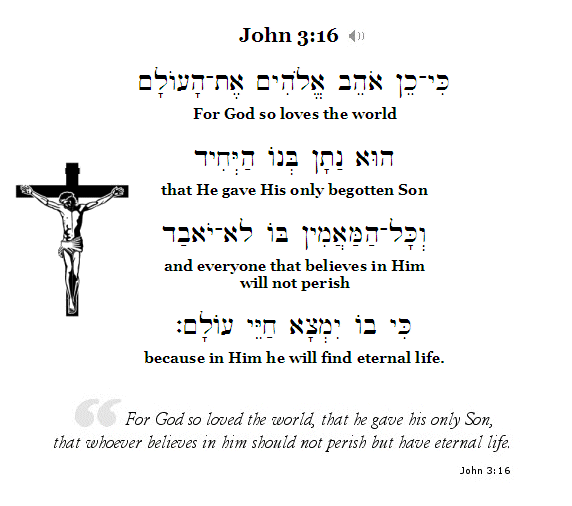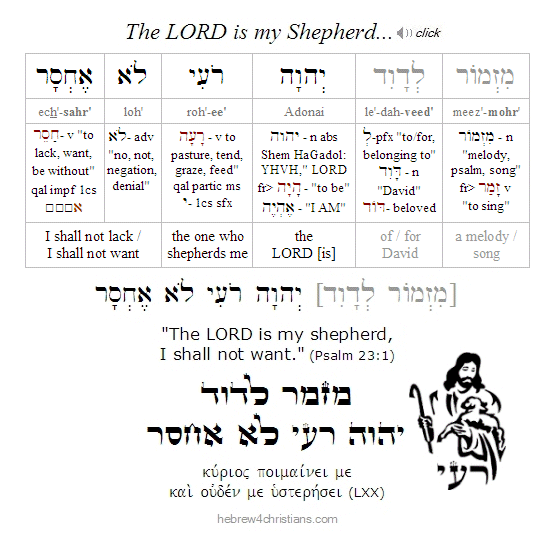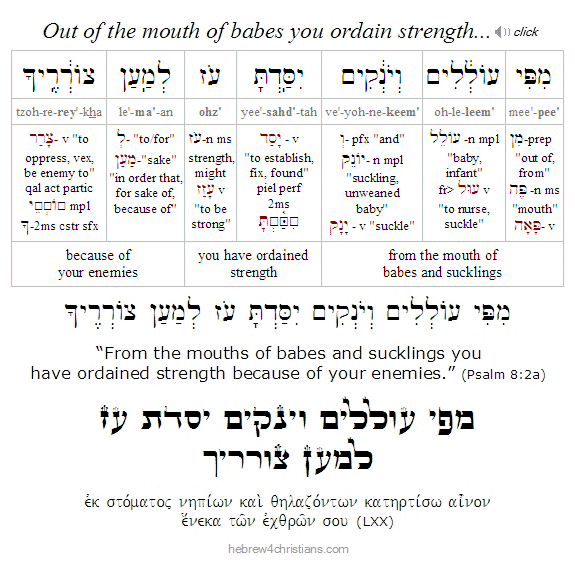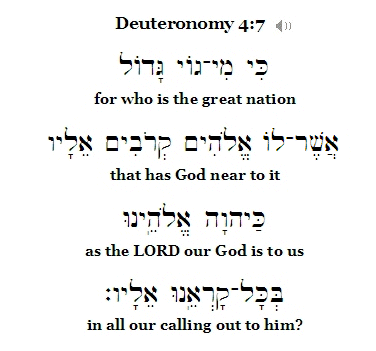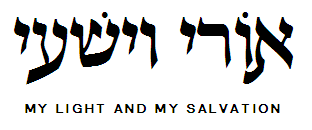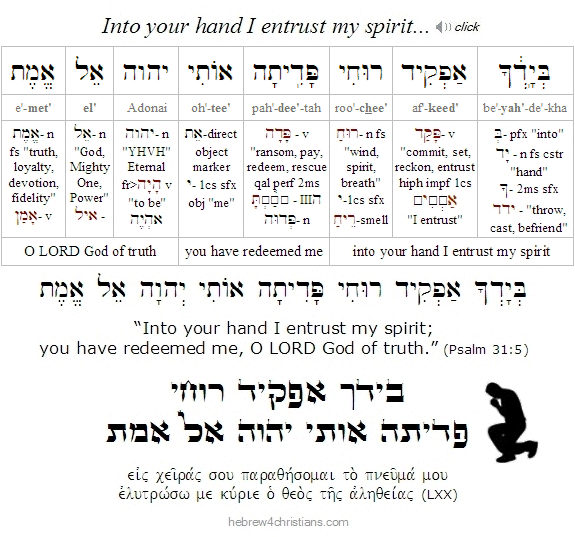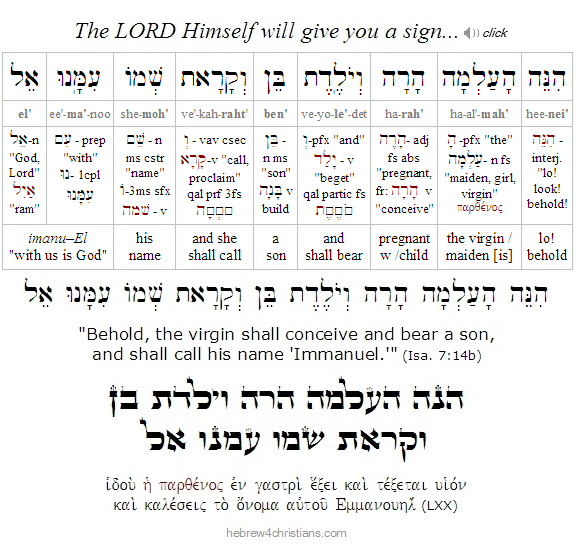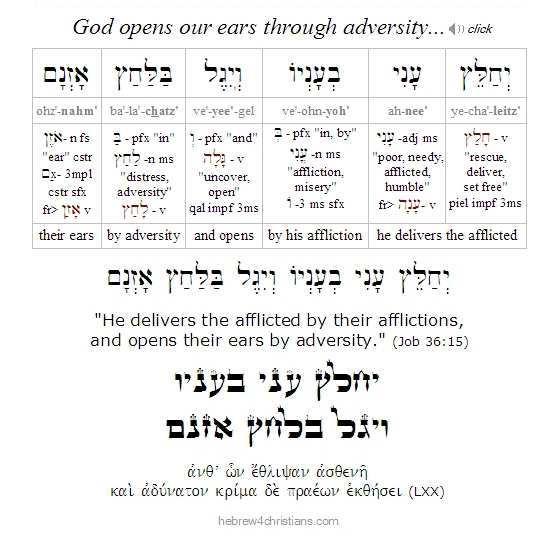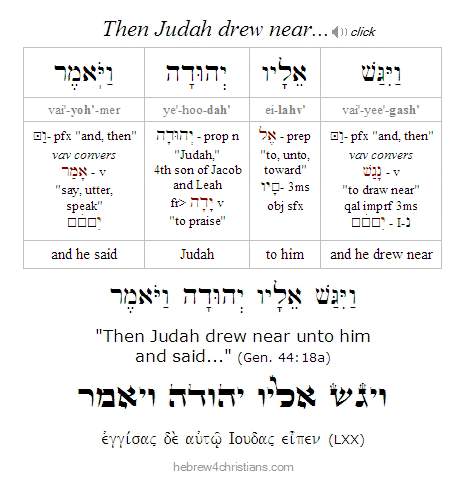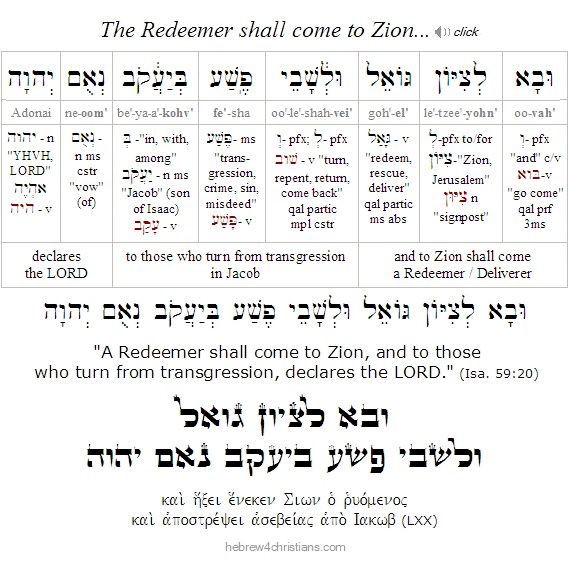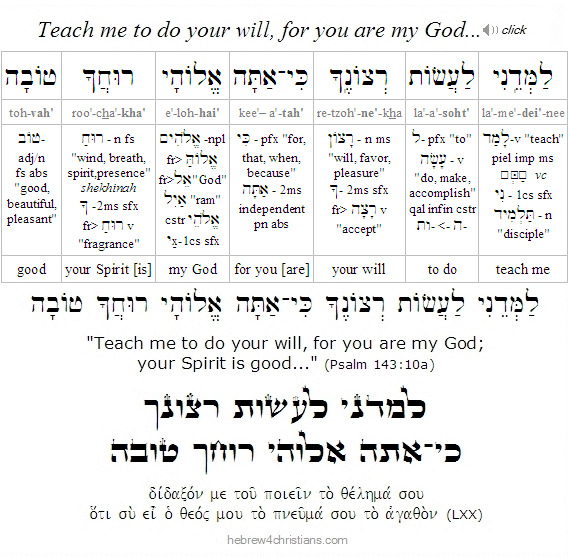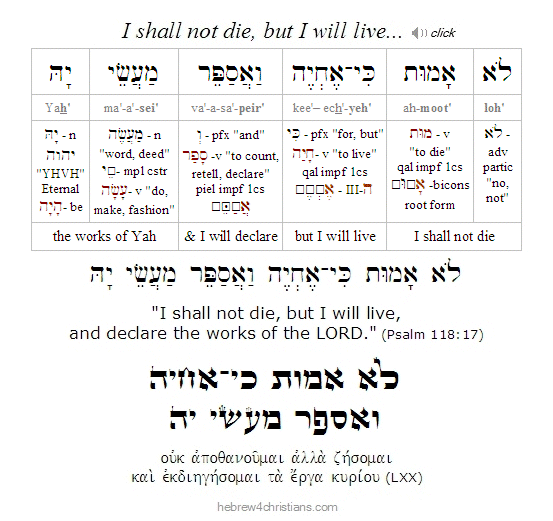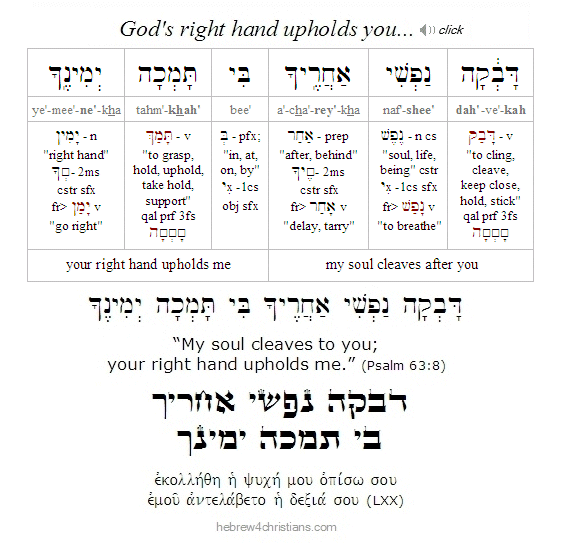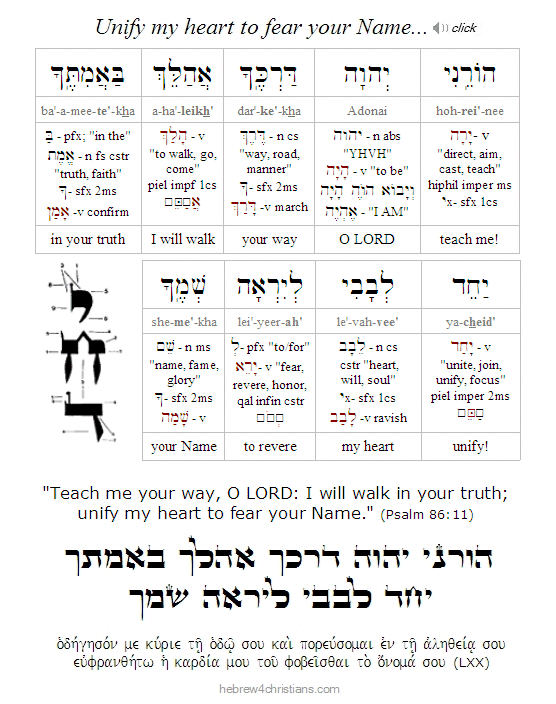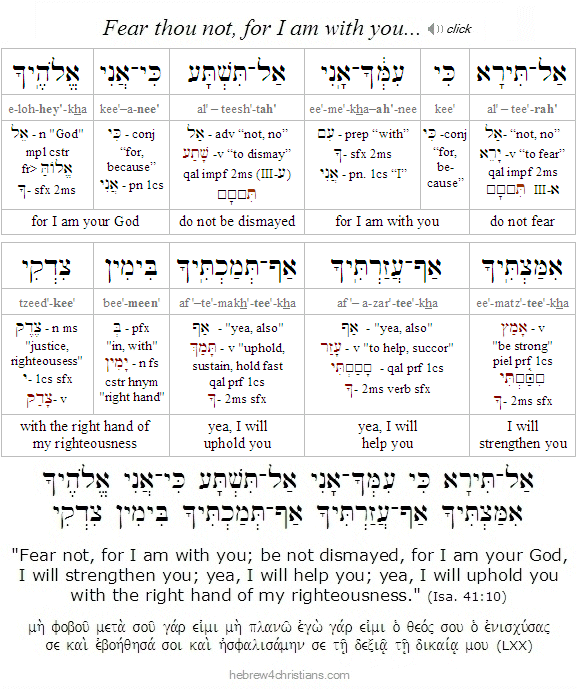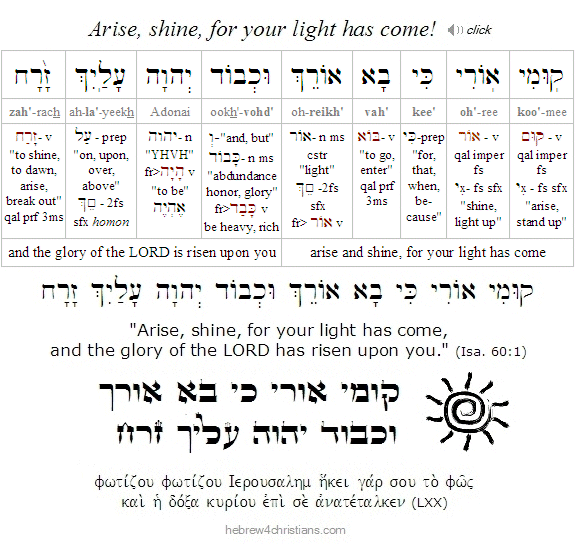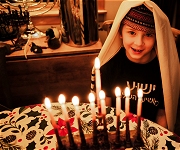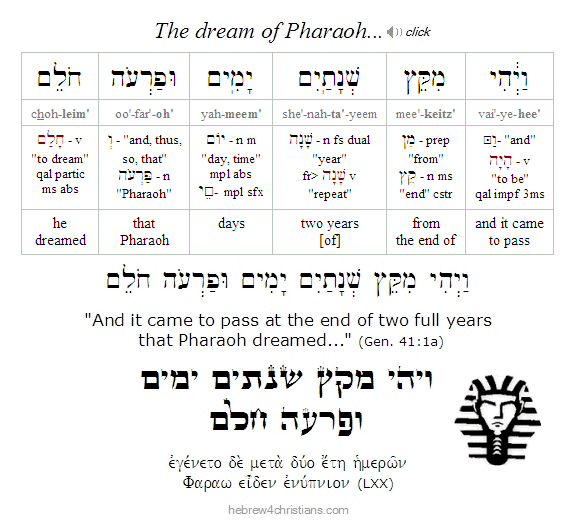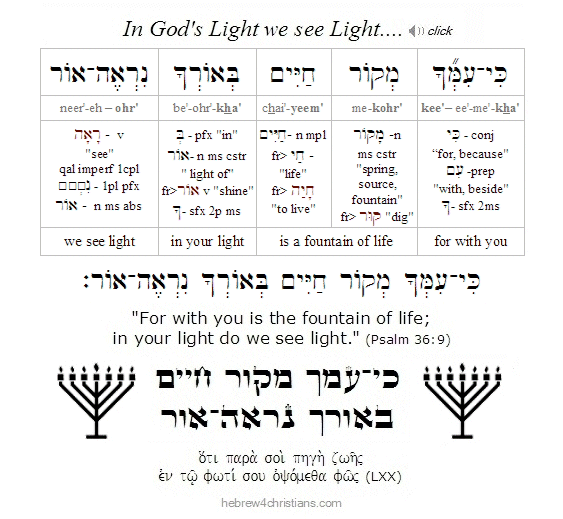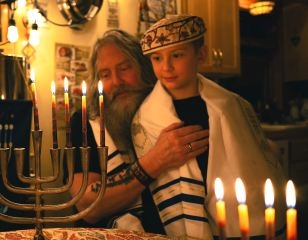|
Jewish Holiday Calendar
For December 2023 site updates, please scroll past this entry....
The Torah divides the calendar into two symmetrical halves: the Spring and the Fall, indicating the two advents of Messiah. The Biblical year officially begins during the month of the Passover from Egypt (called Rosh Chodashim, see Exod. 12:2), and the spring holidays of Passover, Unleavened Bread, and Firstfruits both recall our deliverance from Egypt and also our greater deliverance given by means of the death, burial, and resurrection of the Messiah, the great Passover Lamb of God. Yeshua was crucified on erev Pesach, buried during Unleavened Bread, and was resurrected on Yom Habikkurim (Firstfruits). The holiday of Shavuot (i.e., "Pentecost") both commemorates the revelation of the Torah at Sinai as well as the revelation of the Ruach HaKodesh (Holy Spirit) at Zion, in fulfillment of the promise given by our Lord....
The intermediate months of summer end with the advent of the sixth month of the calendar, called the month of Elul, which recalls the time Moses interceded on behalf of Israel after the sin of the Golden Calf. To commemorate this time of our history, we likewise focus on teshuvah (repentance) in anticipation of Rosh Hashanah and especially in anticipation of Yom Kippur, the great "Day of Atonement." In Jewish tradition the 30 days of Elul are combined with the first ten days of the seventh month (called the "Days of Awe") to set apart "Forty Days of Teshuvah" leading up to the Day of Forgiveness for Israel. Immediately following Yom Kippur, the mood changes as we begin preparing for a joyous week-long celebration called Sukkot (i.e., "Tabernacles") that concludes with the holiday of Simchat Torah.
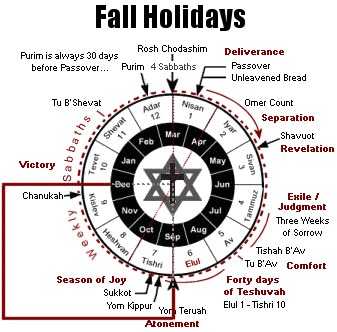 |
The Fall Holidays:

The fall festivals prophetically indicate the Day of the LORD, the second coming of Yeshua, the great national turning of the Jewish people, and the establishment of the reign of the Messiah upon the earth during the Millennial Kingdom in the world to come.
Note that in accordance with tradition, holiday dates begin at sundown. Moreover, some holidays may be postponed one day if they happen to fall on the weekly Sabbath:
1. Month of Tishri (Fri.. Sept. 15th [eve] - Sat. Oct. 14th [day])
3. Month of Cheshvan (Sat. Oct. 14th [eve] - Mon. Nov. 13th [day])
- Four Sabbaths: Noach, Lekh-Lekha, Vayera, Chayei Sarah
- Yom Ha'Aliyah - Honoring Israel's immigrants (Oct. 22nd; Cheshvan 7)
- Sigd - 50th day after Yom Kippur; Ethiopian Jewish holiday (Sun. Nov. 12th)
4. Month of Kislev (Mon. Nov. 13th [eve] - Tues. Dec. 12th [day])
- Four Sabbaths: Toldot, Vayetzei, Vayishlach, Vayeshev
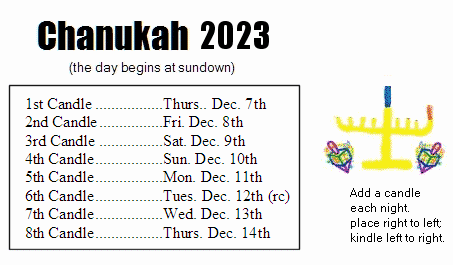
- Dates for Chanukah 2023 (5784):
- 1st Chanukah candle - Thurs. Dec. 7th [i.e., Kislev 25]
- 2nd Chanukah candle - Fri. Dec. 8th [i.e., Kislev 26]
- 3rd Chanukah candle: Sat. Dec. 9th [i.e., Kislev 27]
- 4th Chanukah candle: Sun. Dec. 10th [i.e., Kislev 28]
- 5th Chanukah candle: Mon. Dec. 11th [i.e., Kislev 29]
5. Month of Tevet (Tues. Dec. 12th [eve] - Wed. Jan. 10th [day])
- Four Sabbaths: Miketz, Vayigash, Vayechi, Shemot
- Dates for Chanukah (continued):
- 6th Chanukah candle: Teus. Dec. 12th [i.e., Kislev 30]
- 7th Chanukah candle: Wed. Dec. 13th [i.e., Tevet 1]
- 8th Chanukah candle: Thurs. Dec. 14th [Tevet 2] Zot Chanukah
- Winter Solstice: Wed. Dec. 21st (Tevet 9)
- Christmas - Mon. Dec. 25th (Tevet 13, 5784)
- Asarah B'Tevet - Thurs. Dec. 22nd (dawn), 2023; fast for Jerusalem
- Secular New Year: Mon. Jan. 1st, 2024 (Tevet 20, 5784)
 |
Note: For more about the dates of these holidays see the Calendar pages....
December 2023 Updates
Note: Please refresh the page (or press F5) to see the latest updates...
Wisdom for a New Year...
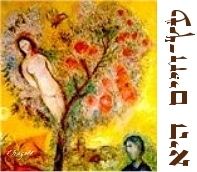
[ "Man is like to vanity: his days are as a shadow that passeth away." - Psalm 144:4]
12.31.23 (Tevet 19, 5784) It is tragic that so many people go about their lives as if God doesn't exist... Instead of soberly acknowledging that their days are numbered in this world, they subconsciously assume they will live forever, and they steadfastly ignore any idea of judgment to come. Yeshua warned us, however, that "nothing is hidden except to be made manifest; nor is anything secret except to come to light" (Mark 4:22). We should tremble before such words. Each of us will give account for what we have done with the time given us (Heb. 9:27; 2 Cor. 5:10; Matt. 12:36).
Moses therefore prayed to God: "Teach us to number our days, that we may apply our hearts unto wisdom" (Psalm 90:12). Each soul is given a finite amount of time in this world, and therefore Moses asked God to teach us how to live in light of our ultimate destiny... For this we need wisdom, which primarily consists of knowledge of the holy (דַעַת קְדשִׁים) and the experience of the awe of the LORD (יִרְאַת יְהוָה, Prov. 9:10). Note then the connection between learning to "number our days" and apprehending the sacredness of life. As we learn to esteem our days, so we discover wisdom for our sojourn to eternity. Reflecting on the brevity of life awakens us to consciously reflect upon the course of our lives and to distill the ultimate concerns of our hearts.
Hebrew Lesson
Psalm 90:12 Hebrew reading:
Consider, then, the "measure of your days..." Your life in this world will end far sooner than you expect, and then what will become of you? I am not here thinking of the end of "the" world, but rather the end of your world - when you will die and face the light of eternity. Today, this moment, you are on the way, going someplace; your "latter days" are already come upon you... If you are not prepared today, how will you be better prepared tomorrow? Today is the day of salvation, the hour that matters most. Learn to die to the world now, to let go of what presently holds you captive, so that you are free to meet that which forever shall come. Don't put off genuine teshuvah: turn while there is still time. As Jim Elliot once said: "He is no fool who gives what he cannot keep, to gain what he cannot lose." And may God give us mercy to say from the heart: "For me to live is Messiah, and to die is gain" (Phil. 1:21).
Yet how many of us take all this to heart? How many of us "number our days" that we might attain wisdom? Do we appreciate the brief amount of time we are given in this life? When we were young we believed we will live forever. King David prayed, "make me know my end and what is the measure of my days; let me know how fleeting I am!" (Psalm 39:4). Amen. May the Lord so awaken our hearts to the reverence and wonder and blessing of life.
God Knows your Name...

12.31.23 (Tevet 19, 5784) The Book of Exodus begins, ve'eleh shemot (וְאֵלֶּה שְׁמוֹת), "and these are the names" (of the children of Israel). God calls each person by name to make the journey... The Creator of all things (הבורא של הכל) calls each star by its own name (Gen. 22:17, Psalm 147:4) and yet He also knows each lily of the field and sparrow that flutters its wings (Matt. 6:28-30, 10:29). As Yeshua said, even the hairs on your head are all numbered (Matt. 10:30). In Jewish theology, the term hashgachah pratit (הַשְׁגָּחָה פְּרָטִית) refers to God's personal supervision of our lives (hashgachah means "supervision," and pratit means "individual" or "particular"). Since God is the Master of the Universe, His supervision and providence reaches to the smallest of details of creation - from subatomic particles to the great motions of the cosmos. Of particular interest, however, are those whom He created be'tzelem Elohim: in His image and likeness. The LORD is called אלהֵי הָרוּחת לְכָל־בָּשָׂר / Elohei ha-ruchot lekhol-basar: "The God of the spirits of all flesh" (Num. 16:22), and that means that every spirit ultimately answers to Him.
We find great comfort when we understand that God has complete authority over categorically everything in the universe -- including our ultimate welfare (John 10:27-28). When we pray to the LORD God of Israel, we intuitively understand that He is completely sovereign and Lord over all things... All power, glory, authority, and dominion is His alone, and all that is in the heaven and in the earth is His (1 Chron. 29:11-12). We do not worry that He is incapable of handling our troubles or that He is unable to help us. No, we acknowledge that the God most High (אֵל עֶלְיוֹן) sustains all things by the Word of His power (Col. 1:17). He is "the blessed and only Sovereign, the King of kings (מֶלֶךְ הַמְּלָכִים) and the Lord of lords" (1 Tim. 6:15). Whenever we think clearly in light of the revelation of Scripture, we apprehend the truth about God's sovereign glory and power...
Hebrew Lesson:
Psalm 139:7 Hebrew reading (click):
Sefer Shemot - ספר שמות

[ "All names of God remain hallowed because they have been used not only to speak of God but also to speak to him." - Martin Buber ]
12.31.23 (Tevet 19, 5784) Over the next several weeks (until the end of March, 2024) we will be reading and studying the Book of Exodus (סֵפֶר שְׁמוֹת) and considering its message in light of the revelation of Yeshua our Messiah. Some of the greatest narratives of all the Scriptures are found in this amazing book, including the Israelites' enslavement and subsequent deliverance with the ten plagues by the hand of the LORD. After the great Passover, Moses led the people out of the land Egypt, crossing the Sea of Reeds, and arriving at Sinai to receive the Torah exactly 49 days later. While Moses was on the mountain, however, the people worshipped a Golden Calf, and a long period of repentance occurred until the covenant was reestablished. The remainder of the book describes the amazing vision and construction of the Mishkan (Tabernacle) -- the great Altar upon which a defect-free lamb (קָרְבָּן תָּמִיד) was offered every day and every night...
In English the word "Exodus" ("going out") comes from the title of the ancient Greek translation of the phrase Sefer Yetziat Mitzraim ("the book of the going out from Egypt"). Hence the Greek word ἔξοδος became "Exodus" in Latin which later was adopted into English. In the Hebrew Bible this book is called Shemot (i.e., שְׁמוֹת, "names"), following the custom of naming a book according to its first significant word.
Hebrew Lesson
Psalm 66:6 reading (click):
Parashat Shemot - פרשת שמות

12.31.23 (Tevet 19, 5784) Our Torah reading for this week is the very first of the Book of Exodus, called "parashat Shemot" (i.e., Exod. 1:1-6:1). This portion begins directly where the Book of Genesis left off, namely by listing the various "names" (shemot) of the descendants of Jacob who came to Egypt to live in the land of Goshen.
Over time Jacob's family flourished and multiplied so greatly that the new king of Egypt – who did not "remember" Joseph - regarded them as a political threat and decided to enslave them. When the king's oppression did not curb their growth, however, he cruelly commanded the Hebrew midwives to kill all newborn Jewish boys. When the midwives bravely refused to obey, however, the Pharaoh commanded that all newborn boys were to be drowned in the Nile river (the Hebrew word for Egypt, Mitzrayim (מִצְרַיִם), can be rearranged to form the phrase tzar mayim (צַר מַיִם), meaning "torture through water," which was the plan of the nefarious Pharaoh).
During this time of terrible and appalling oppression, a family from the tribe of Levi bore a son and hid him for three months. When the baby could no longer be concealed, however, his mother Yocheved (יוֹכֶבֶד) set him afloat in the Nile River inside a basket, praying that he might somehow escape death. Miriam (מִרְיָם), the baby's sister, watched what would happen, and soon the basket was discovered by the daughter of Pharaoh, who decided to save the baby and adopt him as her own son. Miriam then cleverly offered to have her mother become the baby's wet-nurse for the princess. After the child was duly weaned, he was brought to Pharaoh's palace to live as the princess' son. The Egyptian princess named him "Moses" (משֶׁה), meaning "drawn out" (מָשָׁה) of the water.
Later, when Moses was a full-grown man, he "went out to his people and looked on their burdens." When he saw an Egyptian beating an Israelite slave, he killed the Egyptian and hid his body in the sand. The following day he tried to reconcile two Israelites who were fighting, but the one in the wrong prophetically objected: "And who made you a prince and judge over us? Do you want to kill me as you killed the Egyptian yesterday?" Upon hearing this Moses decided to flee from Egypt to Midian. There he rescued Zipporah (צִפּרָה), the daughter of Jethro (יִתְרוֹ), a Midianite priest. Soon afterward, Moses decided to work for Jethro and married Zipporah. They had a son named Gershom (גֵּרְשׁם, "a stranger there").
After nearly 40 years living in Midian as a shepherd, God called out to Moses from the midst of a burning bush (סְנֶה בּוֹעֵר) to commission him to lead the Israelites out of Egypt back to the land He promised to the descendants of Abraham, Isaac, and Jacob. When Moses protested that he was inadequate for this task, God gave him three "signs" to authenticate his message. God also appointed his brother Aaron to be his spokesperson.
Moses and Aaron then went to the Pharaoh and demanded that the Israelites be permitted to leave Egypt to worship the LORD in the wilderness. Shelach et ammi! "Let my people go!" The Pharaoh, however, dismissed Moses and his God, and increased the workload of the slaves by forcing them to make bricks without straw. This set the stage for the great "showdown" between the LORD and the worldly power of Satan, as embodied in the Pharaoh...
May we all have great joy and strength as we begin reading a new book of Torah for this new (secular) year. Chazak ve'amatz, mechayil el-chayil chaverim...
Curses turned to Blessings...

12.29.23 (Tevet 17, 5784) Among other things, our Torah reading this week (i.e., Vayechi) teaches that God can (and does) turn curses into blessings (see Neh. 13:2). There are many instances given in Scripture. For example, Joseph was blessed despite the ill-will of his brothers: "You devised evil against me, but God devised it for good" (Gen. 50:20). Note that the same verb for "devised" (i.e., chashav: חשׁב) is used to describe both the evil intent of the brothers and the good intent of the Lord (Jer. 29:11). This teaches us that God overrules the malice of men to effect his own good purposes, and therefore we can rightfully affirm gam zu l'tovah (גם זו לטובה), "this too is for good" (Rom. 8:28). Underlying the surface appearance of life (chayei sha'ah) is a deeper reality (chayei olam) that is ultimately real, abiding, and designed for God's redemptive love to be fully expressed.
Resist the temptation, therefore, to judge by mere appearances. Forbid your troubles (or the troubles of this world) to darken the eye of your faith. Do not unjustly judge God's purposes or try to understand His ways (Psalm 145:3; Isa. 40:13; Isa. 40:28). As the story of Balaam shows, God makes even the wrath of man praise Him (see Psalm 76:10). "Then God opened Balaam's eyes, and he saw the Angel of the LORD (מלאך יהוה) standing in the way, with his drawn sword in his hand. And he bowed down..." (Num. 22:31). Indeed, the cross of Yeshua is the ultimate expression of how God undoes the evil within the heart of man (Col. 1:20-21). Every knee will bow to the LORD our God and Savior (Isa. 45:22-23; Phil. 2:10-11).
We find comfort that the schemes of the wicked are ultimately subject to the sovereign purposes of the LORD our God. "Ein od milvado" (אין עוד מלבדו) - there is no power that can be exercised apart from God's consent and overarching will... Indeed all authority on heaven and earth belongs to Yeshua, the "the Ruler of the Kings of the earth" (עֶלְיוֹן לְמַלְכֵי־אָרֶץ). As it is written, "All the nations you have made shall come and worship before you, O Lord, and shall glorify your name" (Psalm 86:9). Amen. Beauty for ashes; hashevenu, Adonai...
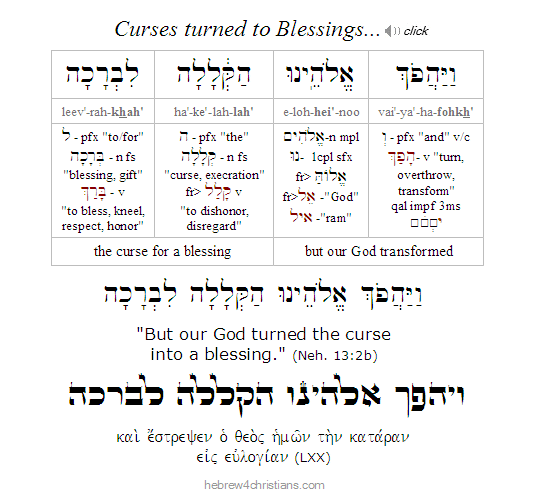 |
Mystery of God's Love...
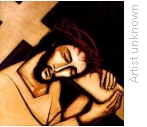
12.28.23 (Tevet 16, 5784) It may seem obvious if you stop and think about it, but all of the commandments of God given in the New Testament are spoken to the "new heart" that was miraculously imparted at regeneration, that is, to the heart upon which the truth of Torah is written "inwardly" (Ezek. 36:26; Jer. 31:33). The unregenerated soul, on the other hand, is unable to receive the deeper truth of salvation, since it always seeks a reason for being approved or accepted; it searches for justification of its life in its own terms, and therefore it lives in state of ongoing despair and secret dread... The message of the gospel, however, is that God saves the "poor in spirit" - the unworthy, the powerless, the lost. If we look for a reason why we are chosen by God, we are tempted to regard God's disposition toward us as conditional and uncertain. God's love is greater than reason, however, for the LORD loves his own simply because he loves them, and that's about all that can be said (Deut. 7:8-10).
Hebrew Lesson
Matt. 5:3 Hebrew reading (click):
"I have loved you with an everlasting love" (Jer. 31:3), which means that God has been and forever will be faithful to us, even when we sin and otherwise break His heart... His love is one of covenant, or promise, of which nothing can nullify or prevent. "Everlasting love" (i.e., ahavat olam: אַהֲבַת עוֹלָם) means that it was present before we were born and will be present after we die. This love "draws us" by divine attraction to understand that we are beloved of God, his redeemed children, and heirs of eternity...
Sojourners of Hope...

12.28.23 (Tevet 16, 5784) I have written about the dangers of being "double-minded" or "two-souled" over the years. This is the ambivalent condition of heart wherein the soul desires two (or more) contrary things at once and therefore is in a state of contradiction and fragmentation. "A double-minded person (δίψυχος) is unstable in all his ways" (James 1:8). This is because he is pulled in conflicting directions, unsure of where he wants to go. And since he is unclear and undecided about what he truly desires, he invariably gets lost within a "repetition" of feckless affections, never able to seek for the highest...
If "purity of heart is to will one thing," then impurity of heart is the result of simultaneously willing two things. It is therefore a state of inner opposition, of having two separate "minds" or "wills" that hold contrary thoughts or desires. Yeshua said that "a divided house cannot stand." A divided heart is at war within itself, "two-souled" and unstable in all its ways...
Paradoxically, there is another danger we may face even if we have inwardly resolved to love the love the LORD our God with all our heart, soul, mind, and strength, and that danger is impatience that may be expressed as discontent of heart. We may feel bereft of our heart's deepest longing. We may go through our days, with worldly concerns and the needs of immediacy, lost in holy distraction. We may experience homesickness, ennui, and sorrow as we return to the dust.
Perhaps you can relate to these words of Hadewijch of Antwerp: "I wander alone and must remain far from him to whom I belong above all that I am, and for whom I would so gladly be perfect love. And - God knows - he has fruition of all, and I lack everything through which my soul might repose in him." As the Song of Songs says: "All night long on my bed I look for the one my heart loves." Does not my beloved cry out to my heart: "O my dove, in the clefts of the rock, In the secret places of the cliff, Let me see your face, Let me hear your voice; For your voice is sweet, And your face is lovely."
I stand looking out through my little window, upon the vastness; my eyes fail as I scan the heavenly abyss; inwardly sighing, groaning, crying for his presence...I rehearse my need; I am swallowed up in my emptiness; all I am is hunger, thirst, and longing, hoping for I know not what -- but his touch.
I recall his comforts, like a dream, the smile in his eyes set upon me, my heart aflame. I have felt his touch, in ecstatic moments; I have warmed in his light; I have heard his voice whisper to me in the dancing wind. But then I return - falling back to earth, to the darkness of the shadows; I am caught in the thicket of the fleeting; my heart prisoned by its fears...
It is a painful contradiction between the person I am when I am close to God's heart, leaning upon his breast, and the faint shade of myself wandering the waste places of the desert. Abraham closed his eyes to this world to see the eternal, but when he opened them he saw once again the emptiness of exile that stretched out before him. Everything was changed through his vision, but everything then became strange, and his dream and his love were whisked into the unseen once again.
That is the "aching side" of hope - the waiting - the gap, the delay, the "already-not-yet" expectation, and the separation forged between this lonely world and our eternal home... Ironically enough, hope itself sees the "divided house" that cannot stand, and finds its refuge in the everlasting habitation of God's house. Hope endures in the midst of our dissolution and fading away; even when all we have left is hope to our very last breath.
Alas, our love for God - at least in this life - remains incomplete and unfulfilled. God's love draws our hearts to him in longing, yet we await the realization of salvation, or as Paul puts it. "we ourselves groan within ourselves, waiting for the adoption, to wit, the redemption of our body" (Rom. 8:23). God "wounds us" to seek Him with greater intimacy and fervor. Such a divine disappointment is a hidden blessing, though, since God's love leads to a greater desire to love God, and this desire leads to further desire, and so on. As it says in the Song of Songs: "I opened for my beloved, But my beloved had turned away and was gone. My heart leaped up when he spoke. I sought him, but I could not find him; I called him, but he gave me no answer." Yet the Beloved did not give up...
"In hope we are saved" (τῇ γὰρ ἐλπίδι ἐσώθημεν), but hope that is seen is not hope, for why would someone hope for what he sees? But if we hope for what we do not see, then we must eagerly wait for it with endurance" (Rom. 8:24-25). As Jeremiah encouraged himself: "The LORD is my portion, saith my soul; therefore will I hope in him. The LORD is good unto them that wait for him, to the soul that seeketh him. It is good that a man should both hope and silently wait for the salvation of the LORD" (Lam. 3:24-26). Or as David said: "I wait for the LORD, my soul doth wait, and in his word do I hope. My soul waiteth for the Lord more than they that watch for the morning: I say, more than they that watch for the morning" (Psalm 130:5-6). Though we must await the fulfillment of our hope, we pray to the LORD: "Place me like a seal over your heart, like a seal on your arm; for love is as strong as death, its jealousy unyielding as the grave. It burns like blazing fire, like a mighty flame" (Song 8:6). "Our soul waits for the LORD: he is our help and our shield. For our heart shall rejoice in him, because we have trusted in his holy name" (Psalm 33:20-21).
Therefore do not give up! Never give up! Press on in hope. In our struggle against the darkness, there is an end coming, so don't let your heart grow numb. Encourage yourself with words of hope. Choose to fight (ἀγωνίζομαι - "agonize," "struggle") another day. Do not yield to despair or give place to anxiety. Press on and keep fighting the "good fight" of faith (1 Tim. 6:12). Trust that the deepest longing of your heart will one day be manifest; there is a "future and a hope" reserved for you (Jer. 29:11). In the end you shall see. "All shall be well, and all shall be well and all manner of thing shall be well." Amen.
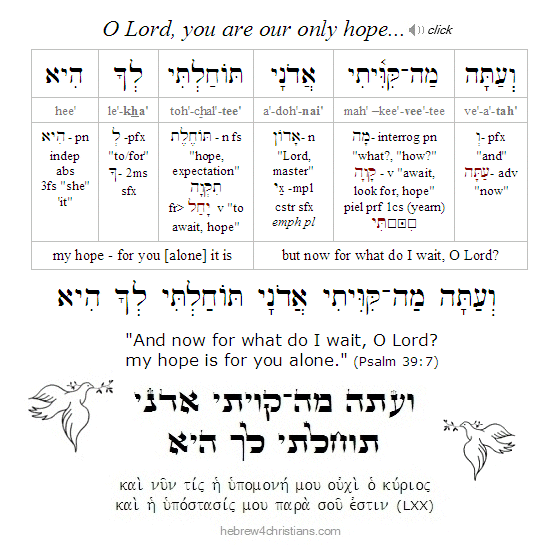 |
Spiritual Death and Rebirth...

12.28.23 (Tevet 16, 5784) People tend to underestimate the radical nature of their sinful condition, which truly is a "sickness unto death." However, even the metaphor of lethal sickness itself is not strong enough, since the spiritual condition of the natural man is spiritual death... Apart from direct divine intervention on behalf of the individual soul, a person is literally unable to respond to God and receive the gift of eternal life. That is why Yeshua taught that we need something miraculous - a spiritual rebirth - in order to see the Kingdom of God (John 3:3; see also Eph. 2:1; Col. 2:13).
This is the new principle of life from God (i.e., chayim chadashim: חַיִּים חֲדָשִׁים) that operates according to the "law of the Spirit of life" (Rom. 7:23, 8:2). God loves His children with "an everlasting love" (i.e., ahavat olam: אַהֲבַת עוֹלָם) and draws us to Himself in chesed (חֶסֶד, i.e., his faithful love and kindness). As it is written: "I love you with an everlasting love; therefore in chesed I draw you to me" (Jer. 31:3). Note that the word translated "I draw you" comes from the Hebrew word mashakh (מָשַׁךְ), meaning to "seize" or "drag away" (the ancient Greek translation used the verb helko (ἕλκω) to express the same idea). As Yeshua said, "No one is able to come to me unless he is "dragged away" (ἑλκύσῃ, same word) by the Father" (John 6:44). We are chosen from above (John 15:16). God's chesed seizes us, takes us captive, and leads us to the Savior... Spiritual rebirth is a divine act of creation, "not of blood nor of the will of the flesh nor of the will of man, but of God" (John 1:13). God is always preeminent, and the salvation of a particular soul is ultimately His prerogative.
Hebrew Lesson
Deut. 7:6b reading (click):
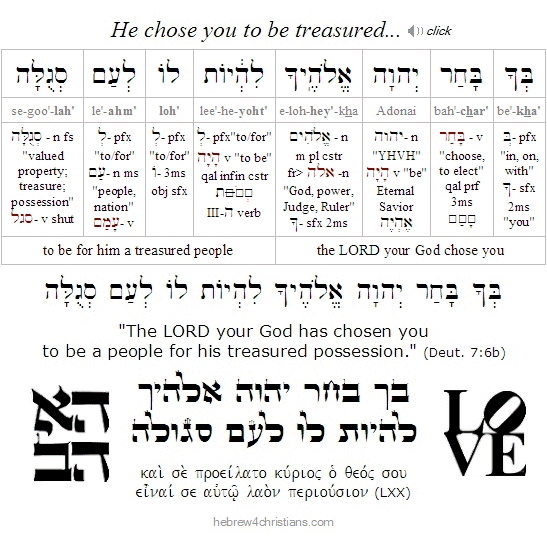 |
Faith Establishes the Law...
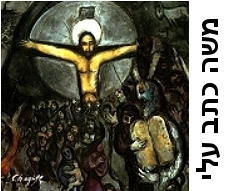
12.27.23 (Tevet 15, 5784) We read in the New Testament: "Do we then make void (i.e., καταργέω, "idle," "deactivate") the law of God through faith? Certainly not! On the contrary, we establish (i.e., ἵστημι, "make stand," "uphold") the law" (Rom. 3:31). How so? We establish the truth of law on the basis of our faith in God's righteousness, not our own. Unlike those who attempt to establish their own righteousness by means of "keeping the law," we confess our inability to do so and throw ourselves upon the gracious provision God supplies for our atonement at the cross. The law teaches us our need for the sacrificial Savior. We are not saved by keeping the law, but that does not mean that we should disregard the truth of the law, nor fail to appreciate the One who kept the law on our behalf -- and then bore its verdict for our sin in his sacrificial death (Gal. 3:13).
Yeshua plainly said that He did not come to abolish the law, but to express its goal: "Do not think that I came to destroy the Law or the Prophets. I did not come to destroy but to fulfill. For assuredly, I say to you, till heaven and earth pass away, one jot or one tittle will by no means pass from the law till all is fulfilled. Whoever therefore breaks one of the least of these commandments, and teaches men so, shall be called least in the kingdom of heaven; but whoever does and teaches them, he shall be called great in the kingdom of heaven. For I say to you, that unless your righteousness exceeds the righteousness of the scribes and Pharisees, you will by no means enter the kingdom of heaven" (Matt. 5:17-20). Heaven and earth have not yet passed away and therefore the Torah has its voice in our lives.
Again, we do not attain "righteousness" by means of the law but by trusting in the righteousness of God given to us by faith in Yeshua our Savior. Indeed only those who believe in Yeshua fully uphold the truth of the Torah and affirm the need for sacrificial atonement for sin (see Lev. 17:11); they do not deny the verdict of the law nor explain away the need for sacrificial blood atonement as the rabbis do (Deut. 27:9-28:68).
The meaning of the cross is understood in light of the judgments of the law - and God's passion to deliver us from spiritual death - for God's truth and mercy are reconciled only there, at the foundation of His throne (Psalm 85:10; 89:14). There would be no need for the cross apart from the law, and there would be no help for the law apart from God's mercy. "If you love me," says Yeshua, "keep my commandments." The love of God is the fulfillment of the law (Rom. 13:8-10; Gal. 5:14; James 2:8). Blessed are those that love the law of the LORD (תּוֹרַת יְהוָה) and meditate upon its truth (Psalm 1:1-3).
Hebrew Lesson
Psalm 89:14 reading (click):
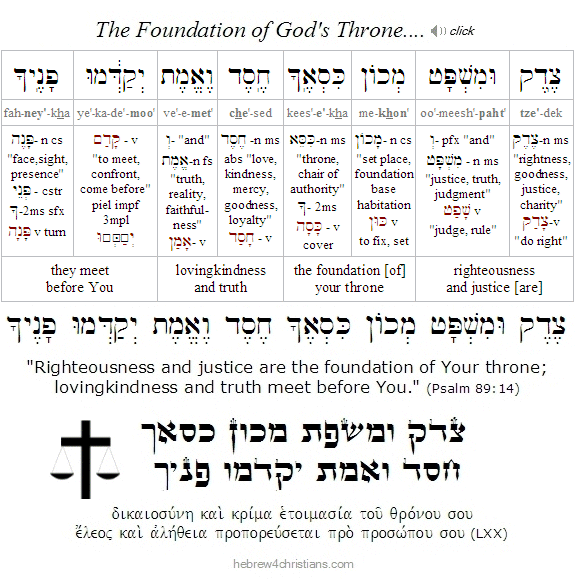 |
Seeing beyond the Seen...

12.27.23 (Tevet 15, 5784) Yeshua told us: "Blessed are those who have not seen and yet have believed" (John 20:29). Despite the struggle of this life - our sorrows, pains, and even death itself - we believe in God's love and promise for us, even if we do not presently see the fulfillment of our hope, just as Abraham believed the promise that he would be the father of an innumerable multitude long before he saw any sign of its fulfillment. Abraham "believed the impossible" and "hoped against hope" (παρ᾽ ἐλπίδα ἐπ᾽ ἐλπίδι), meaning that hope kindled within him even though there was nothing to see in the realm of the natural -- he believed in an unseen good; he trusted in the One who gives life to the dead and who "calls into existence the things that do not exist" (Rom. 4:17). The Scripture comments: "He did not weaken in faith when he considered his own body, which was as good as dead (since he was about a hundred years old), or when he considered the deadness of Sarah's womb. He did not stumble over the promise of God through unbelief but was strong in faith, and gave glory to God, fully persuaded that God was able to do what he had promised, and that is why his faith was counted to him as righteousness" (Rom. 4:19-22).
Likewise we are called to believe in an unseen good, an unimaginably wonderful destiny for our lives, as it says, "Things no eye has seen, nor ear heard, nor mind imagined, are the things God has prepared for those who love him" (1 Cor. 2:9). Faith does not use natural reason or the evidence of the senses to see the unseen, but it "believes to see" through "eyes of the heart" to know the hope of God's calling and to attain the blessing (Eph. 1:18). Faith in God's love comes from a different source and has a different means of apprehension than human wisdom, so that no matter how things might appear in this fallen world, the LORD God may be known and trusted to work all things for our ultimate good. "Blessed are those who have not seen and yet have believed." Amen.
"Faith is the assurance that the best and holiest dream is true after all." - Frederick Buechner
Hebrew Lesson
Psalm 27:14 Hebrew reading:
Personal note: I want to thank all of you who pray for me: I can't do ministry apart from your kindness and support. I sincerely thank God for you and ask Him to help you grow more and more in the grace and truth that is our Lord Yeshua. Shalom uvracha chaverim. - John
Crying out for Healing...
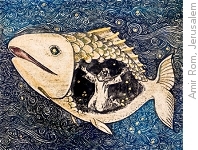
[ "I saw a great oneing between Christ and us, because when he was in pain, we were in pain. All creatures of God's creation that can suffer pain suffered with him. The sky and the earth failed at the time of his dying because he too was part of nature." - Julian of Norwich ]
12.27.23 (Tevet 15, 5784) Where it is written in our Scriptures: "O LORD my God, I cried out to you, and you healed me" (Psalm 30:2), the sages comment that the heartfelt act of crying unto God is in itself a source of healing for spiritual ailments, and that the promise, "I am the LORD who heals you" (אֲנִי יְהוָה רֹפְאֶךָ, Exod. 15:26) means the knowledge that "the LORD is God, and there is none other" (הוָה הוּא הָאֱלֹהִים אֵין עוֹד מִלְבַדּוֹ, Deut. 4:35) is the true cure for troubles of the heart and mind.
Often, however, we resist turning to the LORD God for healing... Like Jonah we first must be "swallowed up" in the consciousness that we are undone and without remedy apart from His direct intervention and deliverance. עָקב הַלֵּב מִכּל וְאָנֻשׁ הוּא מִי יֵדָעֶנּו (Jer. 17:9). Often we find ourselves there - in the "belly of the fish" - and later are resurrected to go forth by God's mercy and grace. Likewise we first see ourselves as dying and go to the cross, finding pardon and given the power of the ruach HaKodesh to live unto God according to the truth.
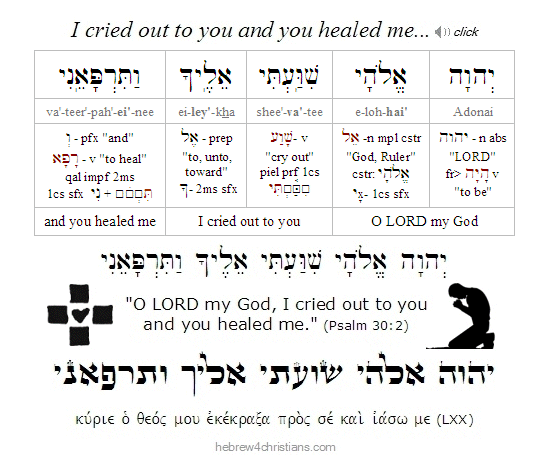 |
The Grace of Torah...
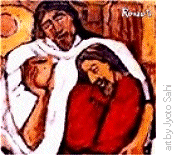
12.26.23 (Tevet 14, 5784) It's been rightly said that God doesn't have any grandchildren in heaven, only children: He is not your "heavenly grandfather" but your heavenly Father (אֲבִיכֶם בַּשָּׁמַיִם). And just as a good father disciplines his children for their own good, so does your Father in heaven (Prov. 3:11, Heb. 12:5-7). The discipline of God leads you to do teshuvah for your ultimate good (Rom. 2:4). As C.S. Lewis once remarked, God doesn't love you because you are good, but He will make you good because He loves you.
The Hebrew word derekh (דֶּרֶךְ), often translated as "way," metaphorically refers to the journey, manner, or course of your life. Because God is tov v'yashar (good and upright), he teaches his children to be yesharim (יְשָׁרִים), i.e., those who walk uprightly. Indeed, the way of the LORD (דֶּרֶךְ יהוה) is "to do acts of charity and justice" (לַעֲשׂוֹת צְדָקָה וּמִשְׁפָּט) (Gen. 18:19). This is the "straight way" (derekh ha-yashar), or the "narrow path" that leads to life (Matt. 7:14). The yesharim are known by the good fruit of their lives (Matt. 7:15-23).
Note that the verb used in this verse (יוֹרֶה) comes from the root yarah (ירה) -- the same root used in the word Torah (תּוֹרָה). Because the LORD is good and upright, He gives us Torah for our lives. God educates us for eternity by imparting to us moral and spiritual truth. As King David taught, "Happy is the man who delights in the Torah of the LORD and meditates upon it day and night" (Psalm 1:1-2).
Surely followers of Yeshua the Messiah should likewise love and study the Torah. After all, Yeshua was the Angel of the LORD (מַלְאַךְ יהוה) who spoke at Sinai when the Torah was given to Israel (Exod. 3:2, Deut. 4:12), and he is the same "yesterday, today, and forever" (Heb. 13:8). During his earthly ministry, Yeshua studied Torah and clearly taught us to keep the ways of the LORD (Luke 4:16, Matt. 7:12). He repeatedly affirmed the central teaching of the Torah – the Shema –putting the duty to love God above all else (Deut. 6:4-6; Mark 12:29). Indeed, the "New Covenant" itself promises that the Torah would be written "upon our hearts" (Jer. 31:31-33, cp. Matt. 26:28) and is inscrutable apart from it – just as Yeshua himself clearly taught (Luke 24:27; see also: Matt. 5:17, Rom. 15:4, 1 Cor. 10:11, 2 Tim. 3:14-17, etc.).
Our Lord Yeshua is called derekh ha-chayim (דֶּרֶךְ הַחַיִּים), the way of life (John 14:6). He is the Wonder of the Torah, its living expression and goal. With the psalmist, therefore, we earnestly pray: גַּל־עֵינַי וְאַבִּיטָה נִפְלָאוֹת מִתּוֹרָתֶךָ / gal einai v'abitah nifla'ot mi-Toratekha: "Uncover my eyes and I will behold wonders from your Torah" (Psalm 119:18). Amen.
Hebrew Lesson
Psalm 25:8 reading (click):
Important Addendum
It's important to keep in mind that by the word "Torah" I am not referring to the Rabbinical traditions of post-Temple Judaism but rather to the "instruction" or "teaching" of the LORD God of Israel. As I've repeatedly explained in my writings, Torah is always a function of covenant -- as man's responsibility -- and therefore Torah has changed in light of God's different covenantal actions in history (Heb. 7:12). Followers of Yeshua abide by the "law of Messiah" (תּוֹרַת הַמָּשִׁיחַ), that is, the teaching of Yeshua the Messiah (John 14:15, Gal. 6:2, 1 John 5:2, 2 John 1:6). For more information about this subject, please see the article entitled "Olam Ha-Torah" as well as various other articles on this site.
Why we Study Torah...

[ "The word of God is always most precious to the man who most lives upon it." - Spurgeon ]
12.26.23 (Tevet 14, 5784) Where is it written, "All Scripture is breathed out by God and profitable for teaching, for reproof, for correction, and for training in righteousness, that the godly one may be complete, equipped for every good work" (2 Tim. 3:16-17), it is to be noted that "the Scriptures" referred to here are the Jewish Scriptures (i.e., the Torah, the Prophets, and the Writings), since they are the foundation, the context, and the overarching matrix for the later New Covenant revelation... These were the Scriptures Yeshua used to contextualize and explain his ministry to his followers: "And beginning with Moses and all the Prophets, he interpreted to them in all the Scriptures the things concerning himself" (Luke 24:27). Indeed when Paul wrote these words to Timothy the "New Testament" Scriptures had not yet been compiled by the leaders of the first-generation followers of Messiah.
How important is the Torah, friends? It is essential as the foundation for all that follows, including the very meaning of the gospel message! In other words, the Torah has both a logical, a linguistic, and a theological priority regarding our understanding of the New Testament, and the failure to read in context invariably leads to faulty interpretations and doctrinal errors of various kinds. "To the Jew first, and [then] to the Greek" (Rom. 1:16) is a principle not only of how the gospel message would transcend ethnic Israel to be offered to all the nations, but also about how we should approach the subject of Biblical hermeneutics. God "breathed out" (θεόπνευστος) his revelation in order, and the message itself must be understood in light of that order (Gal. 4:4-5). Moreover, since all of the New Testament finds its semantic roots in the Torah of Moses and the other Hebrew Scriptures, it is important to study Biblical Hebrew first before studying the Greek New Testament, since the Greek words were translated from the ideas originally given in the Hebrew texts of the Torah.
All of the Torah is amazingly wonderful; it is an inestimably great blessing! After all, what would we know of the creation of the universe and of humanity apart from its pages? What would we know of the reason for sin, sickness and death -- and therefore our need for salvation itself apart from the account of the fall of man as described in Book of Genesis? Or what we know of God's moral truth apart from the revelation of the law at Sinai? Or how could we understand the need for sacrificial blood atonement apart from the sacrificial laws given in Leviticus? Or how would we understand the struggle of the journey of faith apart from the Book of Numbers? Or how would we appreciate the essential duty to love God with all our hearts -- the great Shema -- and the corresponding duty to love others as we love ourselves apart from the Book of Deuteronomy?
So the Torah provides the framework by which we read the Gospels, and apart from this framework we miss much of the original intent and meaning of the Bible... Again, that was Yeshua's approach to the Scriptures, after all. He repeatedly explained to his followers that would have to suffer and die, according to the Scriptures (see Luke 9:22, 9:44; Matt. 16:21; Mark 8:31). He told the disciples on the road of Emmaus: "All things had to be fulfilled, which were written in the law of Moses, and in the prophets, and in the psalms, concerning me (Luke 24:44). Indeed Yeshua chided the rabbis of his day saying: "You search the Scriptures because you think that in them you have eternal life; but it is they that bear witness about me" (John 5:39), and he also said, "If you would have believed Moses, you would believe in me, because he wrote about me" (John 5:46).
So love the Torah, friends; learn its message and study its passages carefully. That's good New Testament theology, after all: "For everything that was written in former times was written for our instruction, so that through endurance and through encouragement of the Scriptures we may have hope" (Rom. 15:4). The Holy Spirit still speaks to the heart of those who love Yeshua, the everlasting King of the Jews: "Oh how I love your Torah (תּוֹרָה); it is my meditation all the day" (Psalm 119:97). For more on this topic, listen to the audio (link below) and read the various articles on Torah here on the Hebrew for Christians website.
Hebrew Podcast
Psalm 119:79 reading (click to listen):
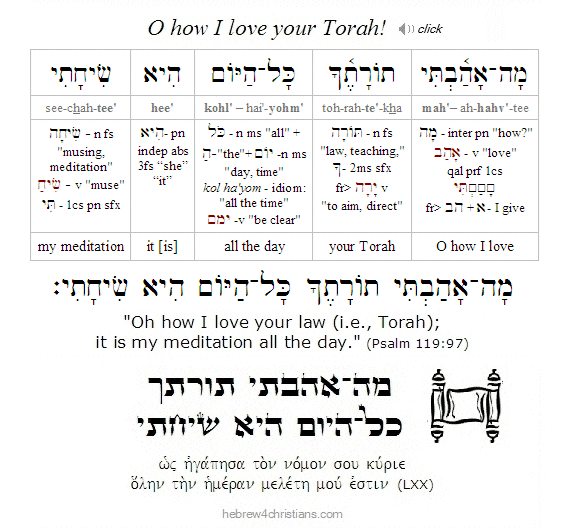 |
Vayechi - "And He Lived..."
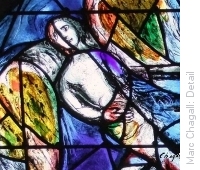
[ Our Torah for this week is Parashat Vayechi, the final portion from the Book of Genesis, which includes Jacob's great prophecy of the coming Messiah... ]
12.26.23 (Tevet 14, 5784) Our Torah reading for this week, parashat Vayechi (i.e., Gen. 47:28-50:26), recounts recounts how the great patriarch Jacob adopted Joseph's two sons (Ephraim and Manasseh) as his own children. When Jacob blessed the boys, however, he intentionally reversed the birth order by putting the younger before the older, signifying that the old struggle he had faced as a child was over, and he now understood things differently. The family had apparently learned that blessing from God is for the good of all, and that there is no real blessing apart from genuine humility that esteems the welfare of others.
Following this, Jacob summoned his sons together to hear his final words of blessing before he died. Of particular importance was Jacob's vision of the coming Messiah, the future King of Israel. It may have been supposed that Reuben, Jacob's firstborn son, would receive the honor of being heir to Messiah, but he was rejected because of his ill-conceived scheme to be regarded as the head of Israel after the death of Rachel, when Reuben "consorted" with Rachel's handmaid Bilhah. This must have been terribly painful to Jacob who was still in mourning over the death of his beloved wife. The betrayal of Bilhah would also have been a crushing blow. So, Reuben was not to be the heir of the promised one. Nor would Simeon, his second son, nor Levi, his third, for they had a history of violence and anger that appalled Jacob over the years - first exhibited when they murdered the Shechemites after their sister had been seduced and violated by a Canaanites prince there (Gen. 34).
When Jacob turned to regard his son Judah, however, he saw the promise of God. Judah, you will recall, had willingly offered up his life to save his brother Benjamin in accordance with his father's will. Because he was willing to die to fulfill his word to his father, Judah was to be praised and his brothers would bow before him. Judah is courageous a lion, willing to die for the sake of honor. Because of this, Judah was chosen be heir to the Messiah himself, the coming one who would exercise dominion over the nations: "The scepter shall not depart from Judah, not the ruler's staff from beneath his feet, until "Shiloh comes" (i.e., he to whom it belongs, namely the Messiah), and "to him shall be the obedience of the nations" (Gen. 49:10). Note that the second part of this prophecy refers to Messiah's coming as "ben David," the great "Lion of the tribe of Judah," who would wash his garments in the blood of God's enemies and subject the nations to the kingship of God (Gen. 49:11-12; Isa. 63:3). After this great declaration of the coming of Messiah, prophecies and blessings were then given over Jacob's other son's, and then Jacob carefully instructed his sons to bury him only in the promised land, and not in the land of Egypt (Gen. 49:10-12; 49:29-32).
Upon Jacob's death, Joseph and his brothers, with various dignitaries of Egypt, formed a funeral procession and returned to Canaan to bury him in the Cave of Machpelah in Hebron. After the funeral, they returned to Egypt, but Joseph's brothers feared that he would now repay them for their former betrayal and threw themselves on his mercy. Joseph reassured them that they had no reason to fear him and reminded them that God had overruled their earlier intent by intending him to be a blessing to the whole world (Gen. 50:20).
The portion ends with the account of the death of Joseph, who made the chiefs of Israel promise to take his bones with them when the LORD would bring them back to the land of Canaan (foreseeing the great Exodus to come). Joseph's faith in the Jewish people's return to the Promised Land is summarized by his statement: "God will surely remember you" (Gen. 50:24). He died at age 110, was embalmed and placed in a coffin in Egypt, full of faith that he would be raised from the dead in the land promised to Abraham, Isaac, and Jacob. Later he was buried in the area of Shechem, the first area of land purchased from the Hittites by Abraham (Gen. 23) that was given to Joseph as an inheritance (Gen. 48:22; Josh 34:22).
Hebrew Lesson:
Genesis 47:28a reading (click):
Addendum to Vayechi...
This week we will finish reading the Book of Genesis (סֵפֶר בְּרֵאשִׁית) for the current Jewish year... This incalculably essential book begins with an account of the creation of the universe by the LORD and the creation of man in His image and likeness. Genesis not only explains the origin of life itself but also the origin of death that came about through Adam's transgression, a condition of "spiritual death" that was passed on to Adam and Eve's descendants and that affects the very fabric of creation. The book then reveals the corruption of the first ten generations of humanity that eventually led to divine judgment by means of the worldwide flood (mabbul). From Noah's line, however, would come Abraham who was called by God to become the patriarch through whom the promised Deliverer would come. The remainder of the book focuses on the lives of the three great patriarchs (Abraham, Isaac, and Jacob), and ends with the story of Joseph, Jacob's firstborn son of Rachel, who eventually brought the entire family of Jacob to Egypt to escape famine. This of course set the stage for the great Exodus from Egypt under the leadership of Moses...
The book of Genesis ends with Joseph dying and being put into a coffin in Egypt (Gen. 50:26). Note that the word translated "coffin" is the Hebrew word aron (אֲרוֹן), a word used elsewhere in the Torah to refer exclusively to the Ark of the Covenant (the ark that Noah built and the ark that Moses was placed in are both called "teivah"). Throughout their desert wanderings, then, after the Sinai revelation, the Israelites carried two special arks - one holding the bones of Joseph and the other holding the tablets of the Ten Commandments.
Hebrew Lesson
Genesis 1:1 reading (click):
The Disguised Egyptian...
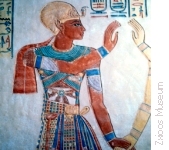
12.25.23 (Tevet 13, 5784) Before he revealed his identity to his brothers, Joseph (arrayed as an unknown Egyptian satrap) ensnared his brothers by hiding a silver divination goblet in Benjamin's sack and then sending his steward (his disguised son Manesseh) to arrest Benjamin for stealing the goblet. All this was designed by Joseph to test his brothers. Would they abandon Benjamin, just as they had abandoned him to die in an empty well years earlier? After the arrest, the brothers returned to face the charges, and Judah nobly stepped forward and begged to take Benjamin's place for the "crime." When Joseph understood that Judah was willing to sacrifice his own life for his brother -- and when he saw the anxious looks of his other brothers -- he realized that they had learned their lesson.
Joseph then sent all the Egyptians out of the room, to spare his brothers embarrassment. According to Midrash, he then turned to his brothers and said, "You told me that your brother Joseph died. Are you sure?" "Yes, we are; he's dead," the brothers assured him. Joseph then became angry and said, "How can you lie? You sold him as a slave! I bought him and can call him right now." Joseph then called out, "Joseph, son of Jacob, come here right now to speak to your brothers..."
Terrified, the brothers turned to see if Joseph was coming. When Joseph saw that his brothers were prepared to meet their brother and ask for his forgiveness, he then spoke to them in Hebrew, "Who are you looking for? I am Joseph. Is my father still alive?" (Notice that Joseph revealed himself to his brothers using Hebrew speech as the token of his identity.) When Joseph saw his brothers draw back in fear at his shocking disclosure, he reassured them by saying, g'shu na elai - "Please come near to me; come and see..."
When Joseph's father Jacob later learned that his long-lost son was indeed alive, vatechi ruach ya'akov avihem - "the spirit of their father Jacob was revived." Though for over 22 years Jacob was bereaved, all along his beloved son was only a few days journey away from him. According to Jewish tradition, Joseph never told Jacob about his betrayal by his brothers, not even when Jacob was on his deathbed. His love forbade him to engage in lashon hara (evil speech) or to bring further pain to his father.
The revelation of Joseph and his reconciliation with his brothers is a prophetic picture of acharit ha-yamim (the "End of Days") when the Jewish people, in Great Tribulation, will come to Yeshua as Israel's deliverer. Presently, the veil is still over the eyes of the Jewish people and they collectively regard Yeshua as an "Egyptian" of sorts.
On a pe'shat level (i.e., literal sense), when Joseph revealed his identity: ani Yosef ha'od avi chai ("I am Joseph; is my father alive?"), he was asking his brothers if his father Jacob was still physically alive. This is puzzling, since in earlier encounters the brothers attested that Jacob was very much alive... On a sod level (i.e., in a mysterious sense), since Joseph is a picture of Yeshua (Mashiach ben Yosef), the question can be phrased, "I am Yeshua - is My father alive?," that is, do you now understand the righteousness of God the Father in raising me from the dead and promoting me to His right hand? Yeshua therefore evokes the confession of faith from the beloved Jewish people: "I am your brother Yeshua: do you now understand that My Father is alive?"
Time is short, chaverim... We are approaching the End of Days and time of "Great Tribulation." In a soon-coming hour Yeshua will speak comforting words to His long-lost brothers (in Hebrew, to be sure!) and restore their place of blessing upon the earth. May He come speedily, and in our days. Maran ata, Yeshua!
Hebrew Lesson
Psalm 69:18 reading (click):
Unto us a Child is born...
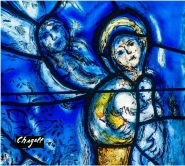
12.25.23 (Tevet 13, 5784) Who is the promised Child that would be given to Israel? Who is the Son that was to be given to the nations? Who is the One called Wonderful Counselor (פֶּלֶא יוֹעֵץ), the Mighty God (אֵל גִּבּוֹר), the Everlasting Father (אֲבִיעַד), and the Prince of Peace (שַׂר־שָׁלוֹם)? Who is the One who in love chose to partake our mortal coil to lift us up into eternal life?
Faith in God's Plan...
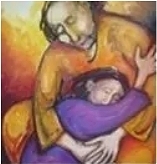
12.24.23 (Tevet 12, 5784) After Joseph dramatically revealed his true identity to his brothers, he asked them to draw near to him and then reassured them saying: "Do not be distressed or angry with yourselves because you sold me here, for God sent me before you to preserve life to preserve for you a remnant on earth, and to keep alive for you many survivors. So it was not you who sent me here, but God" (Gen. 45:4-8). Here we see that Joseph was completely assured that everything that had happened to him up to this moment in time was by divine design, and that even his brothers' cruel betrayal was used by God to elevate him so that he would save many lives and to preserve the future of Israel.
The brothers still wrestled with the shame of their past, however, not fully realizing that Joseph's elaborate charade as a disguised Egyptian was designed to give them opportunity to confess their sin and find healing. Because Joseph was so confident in the providential plan of God, however, he bore no ill-will or grudge against his brothers. The sages note that after the burial of their father Jacob, however, the brothers were fearful that Joseph would finally seek retribution for what they had done to him, so they sent a fabricated message to him which said: "Your father gave this command before he died: 'Say to Joseph, "Please forgive the transgression of your brothers and their sin, because they did evil to you."' And now, please forgive the transgression of the servants of the God of your father'" (Gen. 50:16-17). Joseph wept when he heard this because he realized that his brothers did not believe in his love for them. He repeated that God had sent him there to save lives, and for that he was grateful.
In this connection it is interesting to wonder how Jacob might have reacted after he had discovered the truth that his sons had lied to him after they had maliciously sold his beloved firstborn son into slavery. Perhaps Jacob would have identified with the plight of Joseph because they had much in common. After all, Jacob, like Joseph, had experienced slavery through the betrayal and animosity of his brother Esau. He may also have reviewed his own complicity with his mother when he treacherously "stole" the blessing" from his brother... Perhaps he blamed himself for showing partiality to Joseph after the death of his chosen wife Rachel, too... And we wonder: Did Jacob recall the vision of the ladder that ascended to heaven with the LORD standing above, proclaiming his promise to give him the land, and that in his descendants, all the families of the earth would be blessed. and moreover that the LORD God would never leave nor forsake him? (Gen. 28:12-15). Did he remember wrestling with the Angel, agonizing in his struggle to surrender his life to God's care by holding him to his promise? (Gen. 32:24-28). And how did he understand his beloved Joseph after he realized that he had been alive all along? When he was released from Pharaoh's dungeon, surely he could have sent messengers to inquire of his father and to tell him that he was alive? The story is bittersweet throughout.
Though we are not told of Jacob's emotional reaction to all of this, we later read in the Torah that he blessed all of his sons, both Joseph (and his sons Ephraim and Manasseh) and his other sons, despite having grieved his heart for over 22 years because of their cowardice and duplicity. But like Joseph, Jacob believed that God had orchestrated the affairs of his life - both the good and the evil - according to His sovereign will. Jacob would affirm Joseph's words to his brothers: "It was not you who sent me here, but God," though he also would confess his struggles and suffering along the way: "Few and evil have been the days of my life" (מְעַט וְרָעִים הָיוּ יְמֵי שְׁנֵי חַיַּי) he had told the Pharoah (Gen. 45:8).
Despite the ambivalence he undoubtedly felt, Jacob did not question God's justice or impugn God's character, nor did he blame his sons for his heartache. Jacob's silence in the face of his grief teaches us how to endure by faith, even in the midst of our own fears, struggles, and losses along the way.
And there remains a blessing to impart to others, despite all the troubles that beset our way, too. Our wounds are wounds borne within a heart of faith that refuses to let go of hope and healing. We may have made a mess of our lives; we may have hurt others and betrayed the duty to love, but we do not give up, we do not let our fear be the last word, we do not consign ourselves to despair. We find our consolation in the promise of God. As the book of Job teaches, we receive both the evil and the good from God's hand while affirming his justice, so that even though we return to the dust, we will keep our hope in him (Job 13:15).
We suffer, and life hurts. Often we are afraid. And if suffering is part of God's overarching plan for creation, if it is part of the "divine idea," then how do we learn to emotionally accept it without becoming bitter? We earnestly desire the love and blessing of God, but we are shaken when terrible things happen. We are told not to be afraid, that we are not alone, but we often do feel afraid and alone in our suffering...
First we must find faith that God's decision to create us is for our blessedness rather than for evil, or minimally that it is better for us to have been created than never to have been born (Jer. 29:11). In that sense trusting God represents an affirmation of our life and its value. Whether this is the "best of all possible worlds" is an abstract question for speculative theology, but where we live, in the raw and messy struggles of life, in the midst of our joys and elations, but also in our darkness and pain, we need faith to believe that our existence has some meaning and purpose, that our lives carry some significance, and that not everything is hevel havalim, "vanity of vanities."
The late Frederick Buechner reminds the heart of faith: "The worst isn't the last thing about the world. It's the next to the last thing. The last thing is the best. It's the power from on high that comes down into the world, that wells up from the rock-bottom worst of the world like a hidden spring. Can you believe it? The last, best thing is the laughing deep in the hearts of the saints, sometimes our hearts even. Yes. You are terribly loved and forgiven. Yes. You are healed. All is well." Amen.
So never yield to despair, since that leads to further darkness and fear. Press on and keep fighting the "good fight" of faith (1 Tim. 6:12). Remember that you infinitely matter to heaven; your life has great value; you are significant and you are truly loved by our Heavenly Father. There is a "future and a hope" reserved for you; there is "a white stone, and on that stone will be written a new name that no one can understand except the one who receives it" (Rev. 2:17). May "the trial of your faith, being much more precious than of gold that perishes, though it be tested with fire, be found to result in praise and glory and honor at the revelation of Yeshua the Messiah" (1 Pet. 1:7).
Hebrew Lesson
Jeremiah 29:11b reading (click):
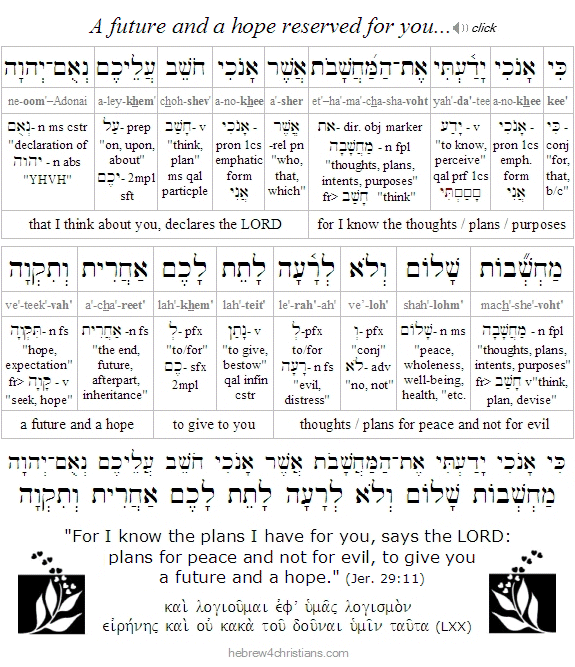 |
Yeshua our Philosopher...

12.22.23 (Tevet 10, 5784) I can sympathize with those of you who feel "unsettled" during this season - whether it's because of the crass commercialism and trivialization of the message of the birth of Yeshua, or because of the mass-media caricatures of the gospel as a "Santa Claus" fairy tale intended to beguile children, or, on the other hand, because you feel the original message has been so compromised by godless culture that it needs to be "retooled" for our generation, and through careful study of Scripture you are assured that Yeshua was actually born during Sukkot, when God "Tabernacled" with us (John 1:14).
I understand the tensions, but I want to remind you that Yeshua calls us to be "philosophers" of sorts -- those who see the "big picture" and understand the deeper meaning of things. Often he chided his disciples for missing the analogical meaning of his teaching, that is, missing the spiritual point of his message (Matt. 16:6-12; Mark 8:15-21). He summarized this several times by saying things like "Man was not made for the Sabbath, but the Sabbath was made for man," thereby putting human need above ritual and religious observance, and he repeatedly taught that the "essence" of the law is mercy, not justice (Matt. 23:23). He regularly spoke in stories and parables rather than "straight-line" thinking to help us get past our biases (Matt. 13:13; Matt. 23:24). He sometimes used irony (John 9:40-41; John 10:31-32, Luke 7:35; Luke 12:16-20) and hyperbole (Luke 14:26; Matt. 18:21-22; Matt. 23:24) to make his points. He spoke in paradox (Matt. 10:39, Mark 9:35; Luke 12:49-51 ). He used similes (Matt. 10:16; Matt. 13:43; Matt. 24:27) and metaphors (Matt. 5:14-16; 12:34; John 6:35; John 10:7-9; 1 Cor. 2:13). He spoke in proverbs (Matt. 6:21; Matt. 15:14) and used wordplay (Matt. 16:18; John 3:8). Yeshua was a philosopher in the truest sense -- a "lover of wisdom," and indeed, He is the very embodiment of all wisdom and truth (Col. 1:16-19; Heb. 1:3; John 14:6; John 17:3; 1 John 5:20).
I say all this just to remind you to take the "high road" and to remember that it is the glory of a man to pass over an offense (Prov. 19:11) and to recall that we are to follow peace with everyone - and holiness - for without such no one will see the Lord (Heb. 12:14). Remember that the central reason for the conception and birth of Yeshua was for Him to die as the great Lamb of God who offered himself up to save lost humanity. This is of "first importance," and if we miss this point we miss it all (1 Cor. 15:3-4; 1 Cor. 2:2). Amen.
Hebrew Lesson
John 14:6 reading (click):
The Wise Still Seek Him...

12.22.23 (Tevet 10, 5784) "A Star shall lead from of Jacob..." Amazingly, the pagan seer Balaam – who may have been a forebear of the "magi of the east" (Matt. 2:1-2) – foresaw the coming of Yeshua the Messiah: "I see him, but not now; I behold him, but not near: a Star shall lead from Jacob (דָּרַךְ כּוֹכָב מִיַּעֲקב), and a Ruler shall arise from Israel" (Num. 24:17). Balaam's prophecy described the coming of the Messiah and his reign in two distinct aspects: "A Star from Jacob shall lead the way (i.e., דָּרַךְ)," this refers to Messiah's first coming as the way of life (John 14:6), "and a scepter (i.e., Ruler) shall ascend (וְקָם שֵׁבֶט) from Israel," this refers to Messiah's second coming to establish the kingdom of Zion after the final redemption.
דָּרַךְ כּוֹכָב מִיַּעֲקב
וְקָם שֵׁבֶט מִיִּשְׂרָאֵל
dah·rakh · koh·khav · mee·ya·a·kohv
ve·kahm · she'·vet · mee·yees·rah·el

"A Star shall lead from Jacob,
and a Ruler shall rise from Israel.
(Num. 24:17)

Hebrew Lesson
Numbers 24:17b reading (click):
As I mentioned the other day, the very purpose and goal of salvation is for us "to turn from darkness to light and from the power of Satan to God" (Acts 26:18). Hashivenu, Adonai... When the darkness seems to enshroud your way, pray for God's light to be rekindled within your soul. The Star still shines! Happy holidays and love to you, friends.
Yom Kippur and Christmas?
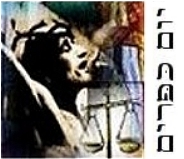
12.21.23 (Tevet 9, 5784) If the priest Zechariah was performing the Yom Kippur avodah when he was visited by the angel Gabriel (as seems to be the case given the context, see Luke 1:8-23), and if his wife Elizabeth conceived about that time (see Luke 1:24, that is, sometime in the middle of the month of Tishri), and her cousin Mary was then told of the incarnation six months later, during Passover season (Luke 1:26, 36), then the birth of Yeshua could have been sometime during the middle of the month of Tevet, which is indeed close to the traditional December 25th date observed by the majority of Christians...
After all, as you read the the prophetic announcement of the birth of John given in Luke, it certainly seems that Zechariah was performing the Yom Kippur ritual at the Temple, offering incense before the parochet before he entered the sacred chamber of the Holy of Holies. Indeed, one implication of this interpretation is that the Lamb of God (שׂה הָאֱלהִים) was conceived during Passover, which seems appropriate as the time of the Incarnation...
ὁ λόγος σὰρξ ἐγένετο καὶ ἐσκήνωσεν ἐν ἡμῖν -- "The Word became flesh and dwelt among us" (John 1:14) -- which of course is the essence of the gospel message. As it is written concerning the birth of Messiah: "For unto us a child is born, unto us a son is given: and the dominion shall be upon his shoulder; and his name shall be called 'Wonderful Counselor,' 'the mighty God,' 'the everlasting Father,' 'Prince of Peace'" (Isa. 9:6).
Hebrew Lesson
Isaiah 9:6 Hebrew reading (click):
Of course the exact date of Yeshua's birth is somewhat irrelevant, apart from the fact that he indeed was born into this world as our Savior, and indeed, the New Testament stresses the significance of his death more than his birth (1 Cor. 2:2; 1 Cor. 15:3-4). And while we may be uncertain about the date of Yeshua's birth, we certainly know that He was crucified on the afternoon before Passover as the Lamb of God. Nevertheless, we use the "good eye" to regard our Christian friends who honor this time to remember the birth of Yeshua, even if we have convictions that may lead us to think Messiah was born during Sukkot.
For some hopefully peaceful discussion about the birth date of Yeshua, see:
Note: The point of this entry was to explore the traditional date as a possibility, not to be dogmatic and intolerant. You certainly do not have to agree with the traditional date, of course, though if you disagree, then you should at least address the pertinent question of what Zechariah was doing in his service when the prophecy of the birth of John was made.
At any rate, though the promised birth of Yeshua may have occurred during the holiday of Sukkot (Tabernacles), with the incarnation (i.e., immaculate conception) occurring during the time of Chanukah (the Festival of Lights), many people of good faith still observe the traditional date. Regardless of your particular conviction surrounding the question, it must be stressed that the most important point is that he was born to die (Heb. 10:5-7; 1 Cor. 15:3-4). Let us walk in peace toward all people (Heb. 12:14). Shalom chaverim.
The Shepherd of Israel...

12.21.23 (Tevet 9, 5784) At the end of this week's Torah reading (i.e., parashat Vayigash), we read that Jacob had finally arrived in Egypt and met with Pharaoh, whom he blessed. When the king asked Jacob how old he was (i.e., kamah yemei sh'nei chayekha - כַּמָּה יְמֵי שְׁנֵי חַיֶּיךָ), Jacob said he was 130 years old, though he added that his days had been "few and evil" (מְעַט וְרָעִים) when compared to the lives of his fathers (Gen. 49:7-10).
Surely Jacob had reason for regarding his life as full of troubles. Estranged from his family at a young age, he became a fugitive to escape the wrath of his wicked twin brother Esau. He fled the land of his fathers only to become an exile who was ruthlessly exploited by his uncle who tricked him into marrying his older daughter Leah instead of the younger daughter Rachel whom Jacob had requested to be his bride. Though later he was permitted to marry Rachel in exchange for additional years of servitude, he lived in the midst of a sibling rivalry and acrimonious strife between the sisters and their concubines. When he finally fled from his uncle's ranch some 20 years later to return home, Jacob learned that his mother Rebekah had died, and some time later, as he finally set foot in the promised land, his beloved Rachel died while giving birth to their son Benjamin. Tragically Rachel never got to meet Jacob's mother or father before she died.
Later, Jacob gave Joseph - who was his firstborn son from Rachel - a special tunic in recognition of his special status, but Joseph was cruelly betrayed by his brothers and sold into slavery. The brothers then told their father Jacob that Joseph had been killed by wild animals and showed him his blood-splattered tunic. Jacob's hope that his beloved son would become a great leader and heir of the family was shattered, and he lived under that cloud for another 22 years before learning that Joseph was indeed alive, after all...
The sages say that Jacob appeared older than his years because of his suffering, and that is why he regarded his days as "few and evil." However in this connection they note the linguistic similarity between the Hebrew word "evil" (רָעָה) and the word "shepherd" (רֹעֵה) which they thought suggested that what we perceive as evil or misfortune is nevertheless conducted by our Shepherd who guides our way (Psalm 23:1). Often we do not understand why things happen the way they do, but a person of faith refuses to indulge in self pity or to be embittered over what God has decreed for their life.
So while Jacob said that the days of his life had been "few and evil," he nevertheless reconciled himself to God's will and regarded the LORD as his Shepherd. Indeed before he died Jacob asked Joseph to bring his sons Manasseh and Ephraim to his bedside so that he could bless them as his own children. When Joseph brought them to Jacob he said: "God, before whom my fathers Abraham and Isaac walked, the God who has been my Shepherd (האֱלֹהִים הָרֹעֶה אֹתִי) all my life long to this day, the Angel who has redeemed me from all evil (הַמַּלְאָךְ הַגֹּאֵל אֹתִי מִכָּל־רָע), bless the lads; let my name be named upon them, and the name of my fathers Abraham and Isaac; and let them grow into a multitude in the midst of the earth" (Gen. 48:15-16). At this point in his journey we see that Jacob's heart was resolved as he affirmed that the LORD was the Shepherd who had guided all his days. And just before died, he insisted on being buried in the Promised Land, in the Cave of Machpelah where Abraham and Sarah, Isaac and Rebekah, and Leah his wife were buried, being fully assured that his salvation and the redemption of Israel would be forthcoming as well.
Hebrew Lesson
Psalm 23:1 reading (click):
Blessing of the Broken...
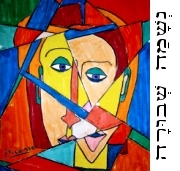
[ As we draw close to another "new year," may we turn our hearts to the LORD... ]
12.21.23 (Tevet 9, 5784) Teshuvah, or "repentance," means turning to God in heartfelt honesty regarding the lethal sickness of our hearts - our instinctual love for sin, our intractable selfishness, our inordinate anger, our faithlessness, our overweening pride, and so on. It is a confession of the poverty of our spirit, our powerlessness to change, and of our great need for deliverance from ourselves.
We are unable to remake ourselves by means of inner resolutions, religious practices, or self-improvement techniques, for we ourselves are the problem, and we are powerless to change ourselves or amend our ways. We may affect superficial change in our lives, but inevitably we reencounter the truth of our inner condition. We may clean the "outside of the cup" while the inside remains "full of ravening and wickedness" (Luke 11:39).
The problem, then, is that we have evil hearts and minds: "For out of the heart come evil thoughts (i.e., διαλογισμός, inner conversations, reasonings), murder, adultery, sexual immorality, theft, false witness, slander" (Matt. 15:20). What we need, then, is an entirely new heart, an inner transformation that comes from the power of God that alone can re-create the human will and rightly order its affections. When King David cried out to the Lord, "Create in me a clean heart, O God," he did not use the Hebrew word yatzar (יָצַר), which means to "fashion" or "form" something from pre-existing material (Gen. 2:7), but he instead used the word bara (בָּרָא), a verb exclusively used in the Torah to refer to God's creation of the cosmos (Gen. 1:1). In other words, King David understood that no amount of reformation of his character would be enough, and therefore he appealed to that very power of God that alone could create the universe yesh me'ayin, or "out of nothing." Such was the nature of the remedy required that was fulfilled in the cross of Messiah...
When we are truly transformed, several things happen simultaneously. First we will overwhelmed by the surpassing love and kindness of God; we will realize our acceptance and forgiveness given through Yeshua, and consequently, our natural love for sin will be mortally wounded, its root severed and its branches cut from the agency of the evil spirit. Just as the Holy Spirit brings new life, freedom, and love for righteousness, so the evil spirit captivates the fallen heart and sustains its lusts and insanity, and this is why we need not only forgiveness of our sins but deliverance from the power of evil that has enslaved our souls. This is why Yeshua is both our Redeemer (גּוֹאֲלֵנוּ) who ransoms us from the verdict of sin as well as our Deliverer (מוֹשִׁיעֵנוּ) who saves us from its power...
So like King David, our repentance must begin in brokenness, with the knowledge of our hopelessly sinful condition, keenly aware of the peril of our lost and forlorn condition. The testimony of the law (i.e., conscience) hounds us in existential fear and alienation from God. Any illusion that we can save ourselves or heal our inner sickness is lost and our rationalizations abandoned. We know "in our kishkes" that we are great sinners, indicted before the bar of truth, and convicted of our transgressions. This is the starting point or "birth pangs" of new life to come. This is the "break" in the hard shell of the seed that brings forth life (John 12:24). It is a wretched blessedness to be "poor in spirit," lost to all hope; it is a severe mercy (Matt. 5:3). We understand how we have wasted our lives, lived foolishly, and brought irremediable sorrow and pain to ourselves and to others.
Sorrow for sin is an essential aspect of genuine teshuvah, then, since it foretells the quickening of faith that reveals what has been lost, squandered, and willfully forsaken. It is therefore the blessedness of mourning (Matt. 5:4). The question of grief reveals the answer, yet the comfort of God is hidden before tearless eyes. "For godly sorrow works teshuvah to salvation" (2 Cor. 7:10).
Genuine teshuvah always leads to confession of sin, and the confession of sin is the confession of our brokenness: "I acknowledged my sin to you, and my iniquity I have not hidden. I said, "I will confess my transgressions to the LORD," and you forgave the iniquity of my sin" (Psalm 32:5). Crying out to God in confession, holding nothing back, offering no excuses but expressing our raw need for his mercy is the means by which our hearts are disclosed to the LORD and by which we come to know his heart for us. We appeal to enthrone God's presence within us and seek to put off the corrupt "old nature" inherited from our common human condition. By God's grace we ask for wisdom and strength to do what is good and pleasing in his sight (Isa. 1:16-17; Micah 6:8; Rom. 12:1). "For thus says the high and lofty one who inhabits eternity, whose name is Holy (הקדוש): 'I dwell in the high and holy place, with him who has a contrite and humble spirit, to revive the spirit of the humble, and to revive the heart of the contrite ones'" (Isa. 57:15).
Our confession of sin is therefore the means to knowing God's great heart for us. It is the "eye of the needle" through which we must crouch down to pass. We know ourselves in relation to the cross - that is, in relation to Yeshua's humiliation for us - for that sets us free to know God's deep passion for us. And confession is an ongoing process. The Hebrew word (יָדָה) means both to confess the truth and to praise. In this life we are still inwardly divided; we have residual evil that wars against the spirit of God. "For the desires of the flesh are against the Spirit, and the desires of the Spirit are against the flesh, for these are opposed to each other, to keep you from doing the things you want to do" (Gal. 5:17). As Paul said, "Though I delight in the law of God after the inward being, I see in my members another law waging war against the law of my mind and making me captive to the law of sin that dwells in my members" (Rom. 7:22-23). We still find ourselves struggling, wretched, fearful, doubleminded, and sinful - even after regeneration and recovering the delight of God's law.
The process of "sanctification" - or growing in your spiritual life - is one of "mortification" or learning to "die to yourself" in surrender to God. Some people regard mortification as a kind of self-denial or self-discipline, though I think it may be better to regard it as an accomplished fact or reality by which we learn to accept and walk by faith. "For through the law I died to the law, so that I might live to God. I have been crucified (συνεσταύρωμαι) with Messiah; it is no longer "I" who live, but Messiah who lives in me. And the life "I" now live in the flesh "I" live by faith in the Son of God, who loved me and gave himself for me" (Gal. 2:19-20). By faith we trust that we already have been crucified with him, just as by faith we trust that we already have newness of life, though all this is merely "theoretical" unless and until the Spirit of God makes it real in our lives: "The wind blows where it wishes, and you hear its sound, but you do not know where it comes from or where it goes. So it is with everyone who is born of the Spirit" (John 3:8). Only the LORD can put a new heart within us; only God can make the new "I" walk in the flesh; only the Spirit can breathe upon dry bones raised from the dust to make them live (Ezek. 37:5).
Again Yeshua said that the problem is one of the heart and its "evil thoughts" (διαλογισμοι πονηροι). We are tethered to ourselves - we cannot escape ourselves - and a divided house cannot stand. Attempting to relate to yourself apart from a relationship with God leads to ongoing despair -- either the despair of resigning into yourself or the despair of fleeing from yourself -- but either way, to a condition of anxiety derived from not being grounded in the life of God... "Unless a seed of wheat falls to the ground and dies, it abides alone..." (John 12:24). Yeshua is the source of all life, and we find nourishment, strength, and the meaning of who we are as we connect with him.
The miracle of the "exchanged life" comes as we surrender to the truth of what God does for us (2 Cor. 5:17). That is the essence of the gospel, "the power of God for salvation for all who believe" (Rom. 1:16). Therefore we do not attempt to crucify ourselves, or labor to reform our corrupt lower nature, but we instead accept that we have been crucified and healed by the mercy and miracle of God. We clothe ourselves in the robes of His righteousness as we celebrate God's redeeming love for our lives. Only then are we empowered by the Spirit to truly "love the LORD and keep his charge" (Deut. 11:1).
The gate is narrow that leads to life, and few there be that find it (Matt. 7:14). That is part of the offense of the cross, after all - the confession you are lost, in darkness, and in need of salvation. Few receive this truth into their hearts because they want to be in control and refuse to let go; few regard their weakness as a blessing that opens the gate to God's strength. But let the weak say "I am strong" because of what the LORD has done! God's grace is sufficient, and his strength is perfected in weakness: "So then, I will boast most gladly about my weaknesses, so that the power of Messiah may reside in me" (2 Cor. 12:9). "I can do all things through the Messiah who strengthens me" (Phil. 4:13).
"I am dead to the law that I might live unto God; I am crucified with Messiah" (Gal. 2:19-20). This is a "positional" truth - something you accept as real based on your faith. You will still encounter weakness of the flesh and struggle with sin, but you reckon yourself dead to sin and alive to God because of what Yeshua has done for you. "For the one who is dead is free from sin" (Rom. 6:7).
Turning to God for life and blessing is a gift from above, indeed it is the greatest gift we can receive in this life. Repentance is not a glummy face or severe demeanor but a profound grace that transports the heart to life, peace, and joy. Its focus is not turning away from sin as much as turning to God (though the two turnings are one). Your repentance leads you to God who is the Source of your life, you heart, your healing, and your destiny. It rejoins you to the Lover of your soul, to your best friend and Savior...
Abraham closed his eyes to see the depths of the stars; Job was overshadowed by the whirlwind; Jonah was swallowed by the great fish to see God's compassion. It was only after Paul realized his blindness of heart that he was able to see the truth of Yeshua, and therefore true teshuvah is the advent of blessedness, the miracle of the Holy Spirit.
Genuine repentance will entirely change you. It is your answer or response (תְשׁוּבָה) for all that God has done on your behalf. You might say, "but I am a miserable wretch!" Indeed it is so, but the consciousness of your wretched state is the heart's cry for love... God goes "outside the camp" to meet with you. He enters the leper colony to join you there, in your wretchedness, and even takes upon your fatal disease. He sees you in your desperate estate and joins you there. God enters into the dust of your death and says, "Live!"
Charles Spurgeon once wrote: "True repentance has a distinct and constant reference to the Lord Jesus Christ. If you repent of sin without looking to Christ, away with your repentance! If you are so lamenting your sin as to forget the Savior, you have need to begin all this work over again. Whenever we repent of sin we must have one eye upon sin and another upon the Cross. Or, better still, let us have both eyes upon Christ, seeing our sin punished in Him and by no means let us look at sin except as we look at Jesus."
We should regard repentance as the conviction of our healing so that can know God's true heart for us. It is the answer (תְשׁוּבָה) to our deepest fears. Keep the cross of Yeshua at the forefront of your meditation: Yeshua was hung eye-level as he suffered and died for you. Judas Iscariot confessed he had sinned, but he never turned to know God's heart for him, and thus he perished in despair. Know your sins only in relation to God's great remedy and passion for your life. See the bleeding visage of the Savior who agonized for your healing as the reason for your repentance. Amen and chag sameach le'chulam.
Hebrew Lesson
Psalm 32:5 reading (click):
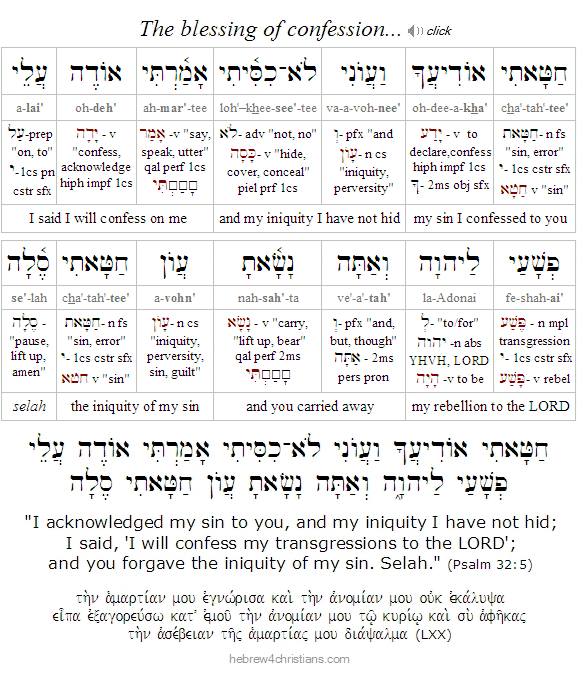 |
Humility of the Messiah...

12.20.23 (Tevet 8, 5784) Though the world system profanes the message of the birth of Messiah for the sake of avarice and greed, let us take a moment to reflect on its ongoing spiritual significance, namely, that God emptied Himself (κένωσις) of His regal glory and power to become your Savior and High Priest, able to fully sympathize with our weakness, frailty, shame, and chronic sinfulness (Heb. 4:15-16; Phil 2:7-8). Almighty God, the Presence of Love, the Heart of Reality, clothed himself in human flesh and bone to become Immanu'el (עִמָּנוּ אֵל) - "God with us" - so that we could be touched by Him, healed by Him, and redeemed by Him... In light of this, it is only fitting we should join the refrain of heavenly host: "Glory to God in the highest, and upon earth peace, good will among all people!" (Luke 2:14). Amen! Yeshua is the Eternal Sign and Wonder of the LORD God Almighty...
Hebrew Lesson
Luke 2:14 reading (click):
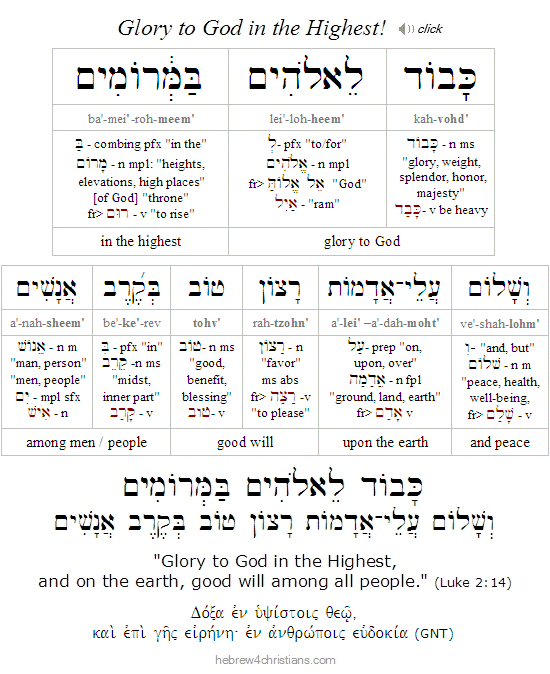 |
Consider the absolute humility of God as He chose to enter into this world as "baby Jesus." Meditate on the glory and sheer paradox of God's love! "Baby Jesus" is the perfect disguise to hide the truth from the proud eyes of the flesh, though the humble of heart can see... "For since in the wisdom of God the world by its wisdom did not know God, God was pleased to save those who believe by the foolishness of preaching" (1 Cor. 1:21). For "who comprehends the mind of the LORD, or gives him instruction as his counselor?" Through his great plan to redeem people from the dominion of Satan and his agents in this evil world, God emptied Himself to become clothed in the frailty human flesh, born in a manger as the great Lamb of God, and born to die as the ransom for all who will believe. Ah, what would we do without the gift of God, friends? What hope would we have? Regardless of the exact date of his birth of His birth, let's thank God that our Moshia (Savior) was willing to be born into this dark world to offer Himself as our sacrificial Redeemer! "For from him and through him and to him are all things. To him be glory forever. Amen" (Rom. 11:36).
Hebrew Lesson
Psalm 8:2a reading (click):
But what are you to do, then, if you sincerely want to follow the Torah's calendar in light of entrenched Christian customs? Well, we certainly may commemorate the birth of Messiah during the holiday of Sukkot (or Shavuot, etc.), though we must be careful to show charity and use the "good eye" toward those who may adhere to the traditional date for "Christmas." Likewise we commemorate the death and resurrection of Messiah during Passover and Firstfruits, respectively, though we do not begrudge those of good faith who honor these great events of salvation during what they call the "Pascha" or even the "Easter" season. Often we are tested in exactly this way, chaverim! We must not miss the "weightier matters" of extending grace to others, as Yeshua clearly taught (Matt. 23:23). As it is written, "Let every man be fully persuaded in his own mind" (Rom. 14:5; Col. 2:16).
Friends, we must test the spirits -- and that particularly includes our own! How do we treat the "stranger" among us? How do we regard the "weaker brother?" Do we demand that our doctrine be esteemed, or do we allow room for others to seek the Lord and his wisdom? Ask yourself: Does this person (or group) honor Yeshua as God the Son, the Redeemer of Humanity who died for our sins and rose from the dead? If so, then keep your heart warm and soft toward him or her, even if he or she has yet to discover the Jewish roots of their faith. "Strive for peace with everyone" (Heb. 12:14). "Let those of us who are mature think this way, and if in anything you think otherwise, God will reveal that also to you" (Phil. 3:15). Though we desire unity with one another (John 17:11), we cannot reasonably insist on doctrinal uniformity, especially in light of the frailty of our shared human condition... The truth of God is known in humility and love.
 |
Abandoned to God's Care...

12.20.23 (Tevet 8, 5784) "Dear Lord God, grant me the serenity to accept what I cannot change - including the insanity of this world, the corruption of godless politicians, the prevalence of sickness and death, the welfare of my family and friends, and so on. O precious Lord, grant me the faith I need to know your sovereign care, and to firmly believe that "all is well and all manner of thing shall be well." Amen.
So much of what happens in this world humbles us and reminds us of our powerlessness and frailty... Getting sick, for example, is a humbling venture, a "kenosis" of sorts -- wherein our flesh, which dies hard, and our inherent pride that vainly seeks to control outcomes, is emptied from us and we are rendered helpless. It is then that God's promise to be our strength in our weakness can be heard, though receiving that is a transaction of the heart that has its good days of faith and bad days of lament and questioning...
I refuse to be anxious over matters that lay completely outside of my control, such as whether some virus (man-made or otherwise) may sicken or even kill me. The same goes for the vile corruption of the political world and its princes... As a believer in the LORD, I understand that my life is not my own, and I willingly surrender it to His good will and care. I will die exactly when the LORD God says that I will die, and not a moment sooner or later. "For whether we live, we live unto the Lord; and whether we die, we die unto the Lord: whether we live therefore, or die, we are the Lord's" (Rom. 14:8). Amen.
Hebrew Lesson
Psalm 23:4a Hebrew reading:
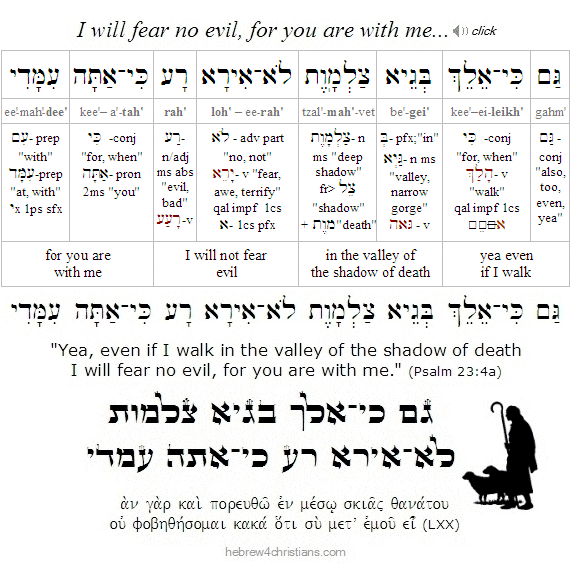 |
Close in all our Calling...
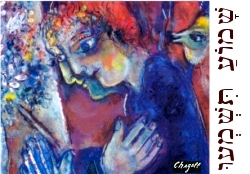
12.20.23 (Tevet 8, 5784) The Torah states that the LORD is close to us "in all our calling to Him" (Deut. 4:7). He listens to all of our heart's cry - our yearning, our lament, as well as our praise, and attends to our daily needs. Our part is to turn to God for help in all that we do: we are to "know Him in all our ways" (בְּכָל־דְּרָכֶיךָ דָעֵהוּ) by trusting in his nearness (Prov. 3:5-6). Even if we feel our prayer is unanswered, we trust despite our temporary darkness, believing that God sees our need and knows what is best for us. God is close "in all our calling to Him" (בְּכָּל־קָרְאֵנוּ אֵלָיו), and therefore we are often brought to a place of need. We endure and find acceptance as we call upon God for help in all that we do.
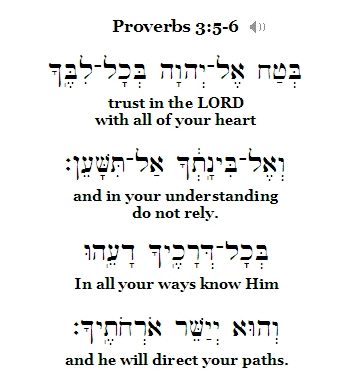 |
"Trust in the LORD with all your heart... know Him in all your ways." The Hebrew word for trust is "bittachon" (בִּטָחוֹן), from a root word (בָּטָח) that means "to lean upon," to feel safe and secure.... Bittachon describes emotional acceptance of the goodness of the LORD. Some of the sages have said that while emunah (אֱמוּנָה), or "faith," represents a state of cognitive understanding (בִּינָה) that God is involved in all the events of the universe, bittachon means emotionally trusting that the Lord is present in every situation for your good.... Rabbi Bechaya put the distinction this way: "Everyone who trusts has faith, but not everyone with faith trusts." Bittachon is an intuitive awareness of the personal love of God for your life, coupled with complete trust that He deeply cares for you (Rom. 8:28). It is an expectation that the love of God is "I-AM-always-with-you" both in this fleeting moment and forevermore.
Being Born Again...

12.19.23 (Tevet 7, 5784) Yeshua taught that we discover the truth about spiritual reality by way of revelation from heaven, not by way of human reasoning. He said that we can come to know God only through Him: "No one has ever seen God; the only God (μονογενὴς θεὸς), who is at the Father's side, he has made him known" (John 1:18).
For example, when a religious leader named Nicodemus visited Yeshua to inquire who he was, Yeshua redirected the inquiry by asking what sort of man he was instead (John 3). Nicodemus was impressed with the reports of miracles ascribed to Yeshua and supposed that he was some sort of teacher sent from God. Yeshua, however, abruptly told him that unless he was "born from above" he would be unable to see the truth of the kingdom (John 3:3). He explained that no one can see the hidden kingdom of God apart from a spiritual "rebirth," that is, a new mode of being that enables the person to enter another realm of existence altogether. Such transformation comes by means of the agency of God's Spirit, that is, by an encounter with God that imparts heavenly life (רוח) to the soul.... Once that happens, the person is able to receive the truth of heavenly things.
Nicodemus objected to the idea of being "born again." "How can a man be born when he is old? He cannot enter his mother's womb and be born a second time, can he?" Perhaps he was suggesting that spiritual rebirth would be as impossible as physical rebirth. People are just too set in their ways to change... Yeshua reminded him of the distinction between the realm of the natural ("born of water") and the realm of the spirit ("born of the Spirit"): "That which is born of the flesh is flesh, and that which is born of the Spirit is spirit. Do not marvel that I said to you, 'You must be born again.' The wind (ruach) blows wherever it will, and you hear the sound it makes, but do not know where it comes from and where it is going. So it is with everyone who is born of the Spirit."
Nicodemus still expressed uncertainty about all this by asking: "How can these things be?" and Yeshua chided him for his shortsightedness: "If you don't believe when I explain in earthly terms, how will you believe if I tell you about heavenly things?" As a respected teacher of Torah, Nicodemus should have known the prophetic teaching of "rebirth" from the Scriptures, such as Ezekiel 36:25-28, Jeremiah 31:33; and indeed he had a responsibility to know this truth. Moreover the general theme of Scripture concerned the coming of Messiah, the Son of Man, who would undo the curse that befell humanity through Adam's transgression, and this meant a new beginning...
To help Nicodemus see, Yeshua reminded him of the episode recorded in the Torah when the people became discouraged about the journey in the desert. At one stop they could not find water and they began to say that the LORD had abandoned them to die there (see Num. 21:4-9). God then sent "fiery serpents" (הַנְּחָשִׁים הַשְּׂרָפִים) that bit the people and many began dying. When the people cried out in distress, God instructed Moses to make a semblance of a fiery serpent and to lift it up on a stake, so that everyone who was bitten could look upon it and live. Yeshua then made the connection for Nicodemus: "Just as Moses lifted up the serpent in the desert, so the Son of Man must be lifted up: so that whoever believes in Him would not perish but have eternal life" (John 3:14-15).
The episode in the desert provides a vivid picture of deliverance for all who have likewise come under divine judgment. The lifted up serpent was an sign of righteous judgment; the people were entirely unable to rescue themselves, and the venom was lethal and without antidote. Only God could save them, and God's way of healing was to have the people look at the impaled serpent to receive life. Only God's power could kill the power of death's hold over them... When Yeshua told Nicodemus that he likewise would be "lifted up," he used the same word used elsewhere to refer to crucifixion (ὑψόω). "Looking at" God's provision for deliverance at the cross is the means of salvation -- that is, the greatest blessing of all: healing from our separation from God, deliverance from the judgment for sin, and the promise of eternal life. Again, all this comes by faith: "looking at" God's remedy means accepting it as being offered for your sake. You are set free from condemnation, you receive newness of life, and you are able to live before God in confidence of his love for you...
"Unless you are born again, you cannot see the kingdom of God." You are blind until God opens your eyes. When Yeshua gave sight to a man born blind, the Pharisees concluded that he could not be a true prophet of God because he healed someone on the Sabbath day (John 9). In response Yeshua said, "For judgment I came into this world, that those who do not see may see, and those who 'see' may become blind." When the Pharisees heard this they asked, "Are we blind then?" and Yeshua replied: "If you were blind, you would not be guilty of sin, but now because you claim that you can see, your guilt remains." Likewise the Apostle Paul was made blind in order to see; he had to lose the blindness of his seeing in order to behold the truth of God's kingdom (Acts 9). As long as Paul thought he could see he remained blind, but as soon as he realized he was blind, he began to be able to see...
The difference between believers and unbelievers does not turn on the problem of sin and the condition of spiritual death - for both are in the same helpless state before God - but rather with the different responses they have toward "the light," that is, the revelation of God manifest in Yeshua. Those who love evil hate the light and turn away from its disclosure, whereas those who "do truth" love the light so that their deeds are revealed as God's power at work within their hearts (John 3:19-21; Eph. 5:13). There is an "exclusive disjunction" in the realm of the spirit: either you will love what is evil and hate the light, or you will love the light and hate what is evil. As Yeshua taught: "No one can serve two masters, for either he will hate the one and love the other, or he will be devoted to the one and despise the other" (Matt. 6:24).
In the end there will be found two types of people: those who love the truth and those who love the lie. These are the children of light (בְּנֵי הָאוֹר) and the children of darkness (בְּנֵי הַחשֶׁךְ), respectively. Followers of Yeshua the Messiah are told to "walk as children of light" / ὡς τέκνα φωτὸς περιπατεῖτε (Eph. 5:8). The children of light are called to be am kadosh - a holy people - separate from the evil engendered by the fallen world and its forces, just as the very first creative expression of God was the separation of light from darkness (Gen. 1:3-4). The children of light "hate evil and love the good," and conversely, the children of darkness "hate the good and love evil" (Psalm 34:21, Prov. 8:13, Amos 5:15, John 3:20-21). Regarding the heavenly Zion to come, it is written: "nothing ritually unclean will ever enter into it, nor anyone who does what is detestable or practices falsehood (lit. "makes a lie"), but only those whose names are written in the Lamb's book of life" (Rev. 21:27).
The essential question is whether you are willing to believe in the light of God's love, or not... What sort of person are you, after all? Yeshua is the light of the world, and those who follow him will not walk in darkness, but will have the light of life (John 8:12). So, do you have ohr ha-chayim (אוֹר הַחַיִּים), "the light of Life," shining within your heart? The light beckons: "wake up, open your eyes, and believe" the good news: darkness and despair will not prevail; your mourning will find comfort, your grief its solace. Your heart's deepest longing shines brightly, even now, if you will but believe... Now may you find courage and remember what is written: "The LORD is my light and my salvation (i.e., my Yeshua); whom shall I fear? The LORD is the refuge of my life; of whom shall I be afraid?" Amen.
Hebrew Lesson
Psalm 27:1 reading (click):
The Good Eye of Faith...
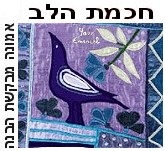
12.19.23 (Tevet 7, 5784) Among other things, the story of Joseph reveals how God's hidden hand moves for good in our lives. Despite the terrible betrayal of the pit, the unjust suffering of the prison house, and the sorrow of losing his family, there was light, exaltation, and joy to come forth. God knows how to take our emptiness to yield "storehouses in Egypt..." As Joseph later told his brothers, "you meant evil against me, but God meant it for good" (Gen. 50:20). Resist the temptation to judge by mere appearances. Forbid your sorrow to blind the eyes of faith. Do not unjustly judge God's purposes or try to understand His ways; accept that He works all things together (συνεργέω) for good -- making even the very wrath of man to praise Him...
Faith "sees what is invisible" (2 Cor. 4:18) and understands (i.e., accepts) that the "present form of this world is passing away" for purposes that are good (1 Cor. 7:31). It affirms that underlying the surface appearance of life (chayei sha'ah) is a deeper reality (chayei olam) that is ultimately real, abiding, and ultimately designed for God's redemptive love to be fully expressed. In this world we must "see through" a mirror (i.e., indirectly) to begin to see the dawn of our eternal home; but one day we will behold God panim el panim (פָּנִים אֶל־פָּנִים), "face to face" (1 Cor. 13:12). In the meantime, faith beholds the invisible light, the truth of God's love that overcomes all the powers of darkness, hate, and fear.... "I believe. I believe in the sun even when it is not shining; I believe in love even when feeling it not; and I believe in God, even when God is silent" (from an anonymous poem found on the wall of a cellar in Cologne, Germany, where some Jews hid from the Nazis).
"Faith in divine providence is the faith that nothing can prevent us from fulfilling the meaning of our existence. Providence does not mean a divine plan by which everything is predetermined, as in an efficient machine. Rather, providence means that there is a creative and saving possibility implied in every situation, which cannot be destroyed by any event. Providence means that the demonic and destructive forces within ourselves and our world can never have an unbreakable grasp upon us, and that the bind which connects us with the fulfilling love can never be disrupted." - Paul Tillich
Hebrew Lesson
Psalm 31:5 Hebrew reading:
For more on this important topic, see "Joseph and the Good Eye."
The Meaning of Life...

12.19.23 (Tevet 7, 5784) Every human culture engages in the art of storytelling to explain its origin, its values, and its destiny. Ancient myths, fables, and folklore were devised to serve that purpose, as were various religious dramas, legends about saints, and other sagas. Since art imitates reality, however, this implies that people everywhere intuitively understand that their individual roles find meaning in the context of a larger story of which they are part... In other words, people invariably tell stories because life itself is a great story, namely, God's story (i.e., His-story), and they sense a profound need to "find themselves" in the story line. Without an ultimate story about the meaning of life as revealed in the Scriptures, however, people are left to their own imaginations and will be unsure about who they really are, why they exist, and where they are inevitably going...
Since people need to find the meaning of life in order to cope with the chaos, suffering, and apparent pointlessness of this world, they invent stories to help them find some provisional comfort. However, the story we tell ourselves - namely, where we come from, who we are, and where we are ultimately going, has profound yet very practical consequences for the development of our inner character. For instance, to instill courage we must find meaning in suffering, but that implies that we see our personal suffering as part of a larger story. Even the pagan philosopher Nietzsche said that he could withstand any "how" in life as long as he had a "why," or a reason. The heart of faith takes this a step further, however, as when the Berditchev Rebbe prayed, "O God, I don't ask you to tell me why I suffer, but only whether I suffer for Your sake." If we fail to find any real purpose for our lives, or if we are unable to believe there is a "cosmic story" behind all things, namely, God's own story, then we will surely lose heart, because the suffering we experience will seem irredeemably pointless... Indeed, secular people today are notable for their practiced heartlessness (i.e., cowardice) because they refuse to see their lives as part of God's great redemptive story. In the intellectual wasteland of the postmodern age, there is no "grand narrative" we are allowed to tell ourselves, there is no objective truth about what is objectively right or wrong, and there is no personal God that directs the history of the universe toward an end. Because of this propaganda, secular people today have lost the ability to discern between good and evil, and therefore they are unable to see any real difference between righteousness and unrighteousness, between villains and heroes, and consequently they are devoid of moral fiber, ethical strength, and honor of soul. Contrary to the spirit of this age, as followers of Messiah we must be resolute regarding our identity as God's redeemed children. We are in the midst of a great spiritual war, called to fight the good fight of faith, and we will overcome the world by the blood of the lamb and the word of our testimony.
Dear friends, "after you have suffered a little while, the God of all Grace (אלהֵי כָל־הַחֶסֶד), who has called you to his eternal glory in the Messiah, will himself restore, confirm, strengthen, and establish you" (1 Pet. 5:10). "So let us not lose heart... For this light momentary affliction is preparing for us an eternal weight of glory beyond all comparison, as we look not to the things that are seen but to the things that are unseen. For the things that are seen are transient, but the things that are unseen are eternal" (2 Cor. 4:16-18). May God be the strength of your heart and your portion forever (Psalm 73:26).
To ask for the "meaning of life" is to ask for the means to life, for the way to find its purpose and significance... According to the Torah of Yeshua, there is a supreme "end of life," an overarching reason for all things, a superlative purpose for the existence of the universe and all that is in it, and that end is found in the greatest story ever told, namely, the story of the glory of God and His redemptive love for us all. This is the true message of Christmas: "For God so loved the world, that he gave his only Son, that whoever believes in him should not perish but have eternal life" (John 3:16). Let's not miss the point of the story - that God chose to enter this space-time as "one of us" so that we could be touched by Him, healed by Him, saved by Him... That's the real miracle, and it's a real miracle for every day of our lives.
Hebrew Lesson
Psalm 73:24 reading (click):
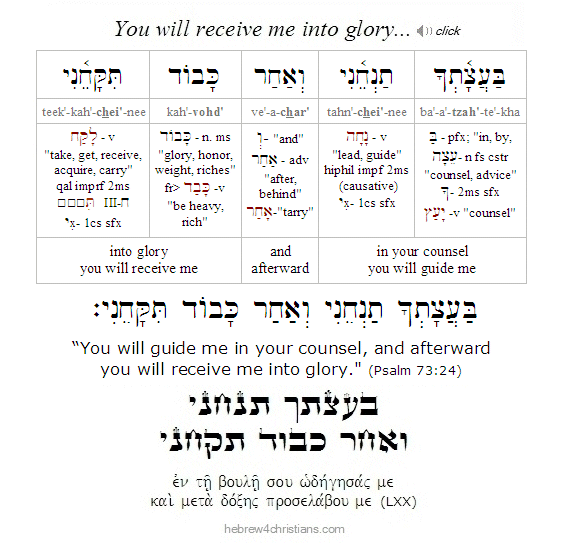 |
The Word Made Flesh...

[ This time of year provides an opportunity to one again focus on the truth of incarnational theology, to celebrate the revelation of God in Yeshua, and to proclaim the miracle that God "emptied Himself" by being clothed in human flesh as the great Lamb of God.... ]
12.18.23 (Tevet 6, 5784) At Mount Sinai we heard the voice of God (קוֹל אֱלהִים) speaking from the midst of the Fire (Deut. 4:33), an event that foreshadowed the great advent of the King and Lawgiver Himself, when the Eternal Word (דְבַר־יְהוָה) became flesh and dwelt with us (Phil. 2:6-7; John 1:1,14). Any theology that regards God as entirely transcendent (i.e., God is beyond any analogy with the finite) will have a problem with divine immanence (i.e., God is inherent and involved within the finite), since the highness, holiness, and perfection of God will make Him seem distant, outside of us, far away, and unknown...
Incarnational theology, on the other hand, manifests the magnificent humility and nearness of God to disclose the divine empathy. Indeed, the LORD became Emanu'el (עִמָּנוּ אֵל), "God with us," to share our mortal condition, to know our pain, to experience the wounds of sin, and to be abandoned, alienated, forsaken. It is God's own bittul hayesh (בִּטּוּל הַיֵּשׁ) - his "self-nullification" for the sake of love and truth. The "Eternal made flesh" bridges the gap between the realm of Ein Sof (אין סוף), the "infinitely transcendent" One, and the finite world of people lost within their sinful frailty. Of course we believe Adonai Echad (יְהוָה אֶחָד) - that the "LORD is One" - both in the sense of being exalted over all things but also in the sense of being compassionately involved in all things (Rom. 11:36). We therefore celebrate the giving of the Torah both at Sinai and especially the at Bethlehem with the birth of Messiah. We celebrate that God is indeed the King and Ruler over all, but we further affirm that God's authority and rule extends to all worlds - including the realm of our finitude and need...
As I've mentioned elsewhere, the climax of Sinai was the revelation of the Sanctuary. The two tablets of the law, summarizing the Ten Commandments, were stored inside the famous Ark of the Covenant (אֲרוֹן בְּרִית־יְהוָה), a sacred "three-in-one" box placed in the innermost chamber of the Tabernacle called the Holy of Holies (קדֶשׁ הַקֳּדָשִׁים). As such, the Ark served as kisei ha-kavod (כִּסֵּא הַכָּבוֹד), the Throne of Glory itself. Upon the cover (or crown) of the Ark (i.e., the kapporet) were fashioned two cherubim (i.e., angel-like figures) that faced one another (Exod. 25:17-18). According to the Talmud (Succah 5b), each cherub had the face of a child - one boy and one girl - and their wings spread heavenward as their eyes gazed upon the cover (Exod. 25:20). It was here that God's Voice would be heard during the Yom Kippur service, when sacrificial blood was sprinkled upon the crown to symbolize the atonement of sin secured through Messiah, the Word that became flesh for us... In the very heart of the Sanctuary, then, we see the Word of God and the sacrficial blood.
The LORD God Almighty was clothed with human skin: our flesh, our bones... The miracle of the incarnation is the "Absolute Paradox," as Soren Kierkegaard once said, wherein the infinite and the finite meet in the inscrutable mystery of the Divine Presence. Here God "touches a leper," eats with sinners and prostitutes, sheds human tears, and suffers heartache like all other men... The gloriously great God, the very Creator of the cosmos, has "emptied Himself" to come in the form of a lowly servant (δοῦλος) - disguised to the eyes of the proud and hardhearted, but is revealed as High Priest to those who are genuinely broken and in profound need. The LORD God is God over "all possible worlds," and that includes both the celestial realms of the heavens but also the world of the fallen, the ashamed, the alienated, and the lost... God's infinite condescension reveals and augments the majesty of His infinite transcendence. There is no world - nor ever shall there be such - where the LORD God Almighty does not reign and have preeminence.
Do not suppose for a moment that the Torah of Moses does not teach "incarnational" theology. Since God created human beings in his image and likeness, the "anthropomorphic language" of Scripture is meaningful. The LORD reveals himself in human terms - using human language, expressing human emotions, and so on, as it says: Moses spoke to God panim el panim - "face to face" (Deut. 34:10). The Torah always has to take on human form - the Word made flesh - for the sake of human beings who live in flesh and blood reality...
The greatest expression of God's word is found in the Presence of Yeshua. This is the Word of God that "tabernacles" with us, full of grace and truth (John 1:14). Yeshua is the "Living Torah" who empties himself to enter our world to rescue us from death. Our Scriptures state that "in these last days God has spoken to us by his Son, whom He appointed the Heir of all things, through whom also He created the worlds" (Heb 1:2). Note that the Greek construction for the phrase translated, "by his son" is ἐλάλησεν ἡμῖν ἐν υἱῷ, which literally means "he spoke to us in Son" -- that is, in the language or voice of the the Son of God Himself... God speaks the language "of Son" from the midst of the fire revealed at Zion. "Therefore, since we are receiving a kingdom that cannot be shaken, let us be thankful, and so worship God acceptably with reverence and awe (μετὰ αἰδοῦς καὶ εὐλαβείας) - for our God is Esh Okhelah - a Consuming Fire" (Heb. 12:28-29).
Hebrew Lesson
Isaiah 7:14b Hebrew reading:
Addendum: Consider further the metaphorical and anthropomorphic language of the Scriptures: God "sees," God "hears," the "hand of the LORD" saves, etc. Without an implied incarnational theology, there would be no language that we could comprehend about God who is the Infinite One that transcends all things... God gets angry; God feels sorrow; God is jealous; God is a lover, etc. all these metaphors bring the language of heaven into the world of humanity... The Spirit that imparts revelation does so inside a human brain and is translated into human apprehension. Yeshua is the Substance of the shadowy talk of analogical language; he embodies God-life before us.... Yeshua is the Word of God made flesh -- able to touch us, know us, share in our suffering, heal us of our sin-sickness, etc.
H4C Podcast:
Believing God's Heart...

12.18.23 (Tevet 6, 5784) When asked what was the most important commandment of all, or, what does God really ask of us, Yeshua quoted the "Shema" passage from the Torah: "Hear O Israel, the Lord is our God, the Lord alone, and you shall love the LORD your God with all your heart, with all your soul, with all your mind, and with all your strength.' He then said: "This is the first commandment" (Mark 12:29-30, quoting Deut. 6:4-5).
The Hebrew word shema (שׁמע) means "listen," so the most important commandment is to hear the truth that the Lord is our God, the Lord alone... Other things may compete for our attention, but what is most essential for us to believe and to know is that the Lord is your God, which, incidentally, is the very first of the Ten Commandments (Exod. 20:2).
The Shema is the call to intellectually and emotionally connect with God as the most important and precious person in your life. "You shall love the Lord your God with all your heart" is the invitation to relate to God on the basis of his great love for you, and faith is your heart's response that receives that love with all of your being. That is the goal of teshuvah, or "repentance," after all: turning to God to find life in his love. Knowing God's heart is your very reason for being; it is the most sacred concern of your life.
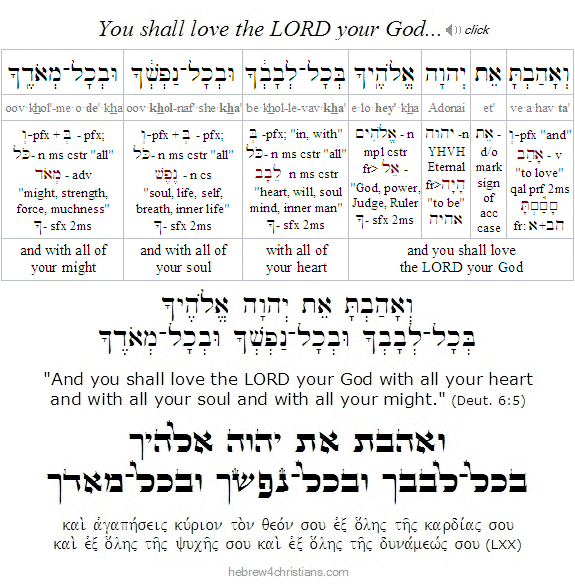 |
Generally speaking, we must quiet our hearts to "make room" to listen, and that implies a measure of self-forgetfulness. To listen well we let go of our need to be in control and then receive what is said in humility. Listening to God honors his presence, trusts his authority, and surrenders to his care. Even in our troubles and our anguish (and especially in those times) our first duty is to quiet our hearts and listen, as it says: "He delivers the afflicted by their affliction and opens their ear by adversity" (Job 36:15).
It is written: "Let every person be quick to hear, slow to speak, slow to anger" (James 1:19), yet we are often just the opposite: slow to hear, quick to speak, and quick to wrath. However, in the midst of our struggles we must be careful to heed the questions the Spirit speaks from out of the whirlwind, as righteous Job did: "Have you entered into the springs of the sea, or walked in the recesses of the deep? Where is the path to the source of light? Where is the home of the east wind?" "Do you know the laws of the heavens, or can you set up their rule over the earth?" (Job 38). Job was astonishingly humbled by hearing such words, so much so that he finally exclaimed: "I know that you can do all things, and that no purpose of yours can be thwarted. You asked, 'Who is this that questions my wisdom with such ignorance?' It is I - but I spoke of things I knew nothing about, things far too wonderful for me... I had only heard about you before, but now I have seen you with my eyes. I abhor myself; I sit in dust and ashes to show my repentance" (Job 42:2-6).
Job's friends, however, had not believed as Job had - that is, they had not seriously listened to God's voice nor faithfully searched for him in the midst of their anguish. Theirs was a "second hand" suffering. Perhaps they had never tasted the dregs of the cup of tribulation as did Job but they still wished to hold to a form of godliness. Their grave error, however, was that they presumed to know the truth when in fact they were impostors, "theological professors" who were too busy rationalizing their own preconceptions to offer any genuine remedy or true comfort to their suffering friend. The Lord listened to Job in his plight and took him seriously, however, because Job was a man of real faith, and he respected the ambivalence that Job felt within his heart, namely that God loved him dearly and yet allowed inexplicable troubles to besiege him - for that was the essence of his struggle, after all, a struggle not to let go of his love for God but to cling to it despite the harrowing loss and destruction of his world (Job 2:10).
Even though he never was given an intellectual explanation for his suffering, Job received something far better, namely the direct revelation of the One who made all things by the hand of his glory. And that is the hope we likewise hold, to one day see our Lord face to face, to behold Him in his beauty and glory forever and ever. We do not need explanations or rationalizations for why we are sometimes vexed with suffering as much as we need the will to endure and to keep believing. And may it please our Lord to help us persevere and remain faithful when we are tested. Amen.
Hebrew Lesson
Job 13:15 reading (click):
The Intercession of Judah...

12.17.23 (Tevet 5, 5784) Shavuah tov and happy holidays, chaverim! In our Torah portion for this week (i.e., Vayigash: Gen. 44:18-47:27) we read about Joseph's dramatic revelation of his identity to his long lost brothers.
Recall that Benjamin had been falsely accused of stealing the Viceroy's chalice and was arrested and brought before Joseph for immediate judgment. Judah then "drew near" (vayigash) and offered to bear the penalty for his brother, pleading with Joseph to spare his aged father the loss of yet another son.
Joseph was so moved by Judah's act of mesirat nefesh (self-sacrifice) that he decided the time had finally come for him to reveal his identity to his brothers. After clearing the room, he began speaking in Hebrew and said, אֲנִי יוֹסֵף הַעוֹד אָבִי חָי / ani Yosef, ha'od avi chai / "I am Joseph; is my father alive?" When the brothers drew back in dismay, Joseph said, "Draw near to me, please" (from the same verb nagash) and explained how God providentially brought him to Egypt to save the family's life....
Hebrew Lesson:
Genesis 44:18a reading (Vayigash):
The revelation of Joseph and his reconciliation with his brothers is a prophetic picture of acharit hayamim (the "end of days") when the Jewish people will come to understand that Yeshua is indeed the One seated at the right hand of the majesty on high as Israel's Deliverer. At that time Yeshua will speak comforting words to His long lost brothers and restore their place of blessing upon the earth.
Indeed, the entire story of Joseph is rich in prophetic insight regarding our Lord and Savior. Vayigash (וַיִּגַּשׁ) means "and he drew near," referring first to Judah's intercession for the sins of his brothers, and then to Joseph's reciprocal desire for the brothers to draw near to him (Gen. 44:18, 45:4). Joseph initiated the reconciliation by saying, גְּשׁוּ־נָא אֵלַי / ge'shu na elai - "Please draw near to me," and indeed there is a play on the verb nagash (נָגַשׁ), "draw near," throughout this story.
Yeshua is depicted both in Judah's intercession (as the greater Son of Judah who interceded on behalf of the sins of Israel) and in Joseph's role as the exalted Savior of the Jewish people in time of tribulation. When Joseph disclosed himself and asked, "Is my father alive," we hear Yeshua evoking the confession of faith from the Jewish people: "I am Yeshua: do you now understand that My Father is alive?" Upon His coming revelation, all Israel will confess that indeed God the Father is "alive" and has vindicated the glory of His Son.
The Providential Prince...

12.15.23 (Tevet 3, 5784) Though Joseph was given great wisdom to interpret Pharaoh's dreams and to serve as Egypt's regent, his foresight did not prevent the famine from coming in the first place, and the testing that came was part of God's hidden plan. The role of the true prophet is to bear witness to God's truth and to shepherd God's people through the unfolding vision. Joseph could not control the outcome, though he worked within the context of revelation to bring about deliverance. In both the "fat times and the lean" we look to God for comfort and strength: We "show up" every day to ready ourselves for what is coming, even if we currently find ourselves in darkness. We refuse fear because we trust that the LORD our God is guiding our way...
The term hashgachah pratit (הַשְׁגָּחָה פְּרָטִית) refers to God's personal supervision of our lives (hashgachah means "supervision," and pratit means "individual" or "particular"). Since He is the Master of the Universe, God's supervision and providence reaches to the smallest of details of creation - from subatomic particles to the great motions of the cosmos. God not only calls each star by its own name (Psalm 147:4), but knows each particular wildflower and sparrow (Matt. 6:28-30, 10:29). Each person created in the likeness of God is therefore under the direct, personal supervision of God Himself -- whether that soul is conscious of that fact or not. As Yeshua said, even the hairs on your head are all numbered (Matt. 10:30). The God of Israel is also called אלהֵי הָרוּחת לְכָל־בָּשָׂר / Elohei ha-ruchot lekhol-basar: "The God of the spirits of all flesh" (Num. 16:22), and that means that he has providential purposes for every human being brought into this world (John 1:4).
Hebrew Lesson
Psalm 139:7 reading (click):
Joseph and his brothers...
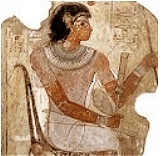
[ The following is related to our Torah portion for Chanuakah week, parashat Miketz... ]
12.15.23 (Tevet 3, 5784) The Torah says that "Jacob loved Joseph more than all his other sons" (יִשְׂרָאֵל אָהַב אֶת־יוֹסֵף מִכָּל־בָּנָיו), since he was the son of his old age, and the firstborn son (bechor) of his beloved wife Rachel (Gen. 37:3). Indeed, Jacob and Joseph shared a lot in common: Both had infertile mothers who had difficulty in childbirth (Rebekah and Rachel); both of their mothers bore two sons (Rebekah: Esau/Jacob; Rachel: Joseph/Benjamin); both were hated by their brothers, and perhaps most significantly, both had lost their mothers (Joseph was present when his mother died, whereas Jacob never saw his mother again after he fled from his brother Esau). Perhaps this explains why Jacob favored his Joseph and made for him the ketonet passim (כְּתנֶת פַּסִּים), a full-sleeved robe or ornamental tunic that set him apart from his other sons, and perhaps this also explains Joseph's juvenile boasting about his "dreams of preeminence" over his brothers.... Indeed, the story of Joseph is, among other things, a story about his dreams. As a young man, his dreams centered on himself, which led to his betrayal and fall; after being humbled in prison, he focused on the dreams of others, which led to his exaltation...
There is a lot of mystery surrounding the life of Joseph ben Yisrael. Like his father who fled from the hatred of his brother Esau, Joseph became a victim of his brothers' malice. After being betrayed and sold into slavery as a teenager, Joseph later seemed to abandon his family identity, perhaps like his estranged uncle Esau. He had no "Bethel" experience along the way, however. Indeed, upon his release from prison he was thoroughly "Egyptianized." Joseph wore Egyptian clothes, spoke fluent Egyptian, married an Egyptian wife, assumed an Egyptian name, and named his firstborn son "Manasseh" (מְנַשֶּׁה), a word that comes from the verb nasah (נָשָׁה), meaning "to forget." It's clear that Joseph wanted to forget his past life. After all, despite his ascendancy in Egypt -- when he had the means to reconnect with his long-lost family (including his father and brother Reuben who were deceived into thinking he was dead) -- he did nothing to contact them. (For more on this, see "The Heart's Truth.")
The truth (i.e., aletheia: ἀ+λήθεια) cannot be forever forgotten, however. When his brothers finally reappeared in his life seeking help, it had been 22 long years since they had last seen him (incidentally, the very same amount of time Jacob had been away from his family as well). Joseph was now forced to deal with his past life. But he played the part of a "stranger" and withheld his true identity... As part of his charade, Joseph bound and imprisoned Simeon (who, according to tradition was the brother who originally threw Joseph into the pit). It was then that the brothers remembered what they had done to Joseph when they betrayed him as a child. Here the Torah adds a detail not originally given in the story of Joseph's betrayal, namely, that the brothers had ignored Joseph's desperate cries for help (Gen. 42:21-24). Perhaps the shock of seeing their helpless brother Simeon bound before them reminded the brothers of the terrible pain they had once caused Joseph...
If you are familiar with the drama, you recall how Joseph then demanded that his brother Benjamin be brought from Canaan in order to corroborate the brothers' story. Benjamin - the last link to Jacob's deceased wife Rachel and full brother to Joseph - had surely taken Joseph's place as Jacob's favorite son, and Jacob was unwilling to part from him. The famine, however, forced the issue and Judah swore to his father to take personal and eternal responsibility for the welfare of his beloved son... Jacob finally relented in a state of fearful resignation.
So the brothers, this time with Benjamin, trekked back to Egypt. Although the sages argue about the exact chronology, it is clear that Benjamin was not a child when Joseph was thrown into the pit at age 17. When he finally saw his brother again, Joseph was so overcome with emotion that he left the room to weep. A midrash tells of the conversation between Joseph and Benjamin that brought tears to Joseph's eyes. Joseph asked Benjamin, "Have you a full brother, one who has the same mother as you?" "I had a brother," answered Benjamin, "but I do not know where he is." "Do you have sons?" asked Joseph. "I have ten." "What are there names?" "I named them all after my brother and the troubles that befell him. One is called "Bela" because my brother was nivlah - swallowed up - and disappeared. Another is called "Bechor" because he was the bechor (firstborn) of his mother. A third is called "Achi" because he was achi, my brother, and a fourth is called "Chuppim" because he did not see my chuppah (i.e., wedding day)." So Benjamin explained the names of his ten sons and Joseph was full of love for his brother and sadness for the time they had not shared together.
Another midrash tells the story about how Joseph seated his brothers from youngest to oldest (Gen. 43:33). He wanted to have Benjamin sit next to him but was unsure how to arrange the seating without arousing suspicion. Picking up his goblet and pretending that it had magic powers, Joseph called out the brothers names: "Reuben, Simeon, Levi, Judah," and so on from oldest to youngest. When he came to Benjamin, he said, "He has no mother and neither do I. He had a brother who was separated from him at birth, and so did I -- let him sit next to me!" The fivefold portion given to Benjamin was meant to test the brothers to see how they would react to a brother being shown preferential treatment.
When Joseph later "framed" Benjamin for stealing the "divination goblet," he was masterfully recreating a situation similar to the one in which he was sold by his brothers. Had they changed? Would his brothers abandon Benjamin as they had abandoned him in his hour of need? In order for there to be genuine reconciliation, Joseph needed to see if his brothers had really undergone teshuvah. When Judah stepped forward to take the place of his brother, he willingly accepted the guilt of them all. When Judah said, "What can we say, my lord; God has found out our sin" (Gen. 44:16), he was not confessing to the theft of the divination cup, but rather to the brothers' crime of throwing Joseph into the pit and selling him as a slave...
The Hebrew word "Miketz"(מִקֵּץ) means "at the end of" and points to prophetic future (i.e., the "end of days" or acharit ha-yamim). Just as Joseph was a "dreamer" who was betrayed by his brothers but was promoted to a place of glory by the hidden hand of God, so Yeshua was betrayed by his people yet was exalted over all the nations (מֶלֶךְ הַגּוֹיִם). And just as Joseph later disguised himself as a "stranger" and an "Egyptian" to his brothers but was finally revealed to be their savior, so will the Jewish people come to see that Yeshua is the true Savior of Israel. Then will come true the hope of Rav Sha'ul (the Apostle Paul) who wrote, "And so all Israel shall be saved: as it is written, There shall come out of Zion the Deliverer who shall turn away ungodliness from Jacob" (Rom. 11:30).
Amen. Let that day come! Happy Chanukah, chaverim...
Hebrew Lesson
Isaiah 59:20 reading (click):
Chanukah and Vigilance...
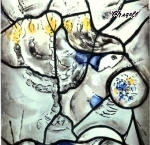
12.14.23 (Tevet 2, 5784) The message of Chanukah is to resist being "assimilated" into this dark world and its benighted culture. As it says, "Do not be conformed to this world, but be transformed (i.e., transfigured by the light) through the renewal (ἀνακαίνωσις) of your mind, that by testing you may discern what is the will of God" (Rom. 12:2). Notice that the Greek word translated "conformed" is a passive verb (συσχηματίζω, derived from σύν, "with," + σχῆμα, "matrix") which means that we must consciously resist being lulled into accepting this world's various ideologies (matrix) that are crafted to ignore Divine the Presence and Truth. In the realm of the spiritual, there is simply no place of neutrality, and if we are not going forward, then it's likely we are going backward... Therefore we are repeatedly commanded to test the spirits and to examine truth claims. We ask God for wisdom and use the discernment that comes from the Holy Spirit.
Hebrew Lesson:
Psalm 143:10a Hebrew Reading (click):
We must exercise diligence to ensure we are not taken captive by the world and its seductive deceptions. Both Passover and Chanukah celebrate spiritual freedom, and indeed the very first word given at Sinai was "I AM the LORD thy God who brought you out (הוֹצֵאתִיךָ)... of the house of slavery" (Exod. 20:2). God's first concern is to be known as your Deliverer, the God of your freedom. Therefore the Spirit of God says, "Thou shalt be free" (2 Cor. 3:17; Gal. 5:1). Set your focus, then, on the Divine Presence and refuse to live in fear of mere men and their political schemes. God has an appointment scheduled with the princes of this world, though we trust our Good Shepherd who keeps us from the wrath to come...
Through the Wound...
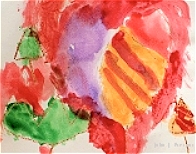
12.14.23 (Tevet 2, 5784) "Find God or die" is a slogan for those who are desperate for deliverance. Many of us have felt abandoned at some time, perhaps because of a tragic event that happened when we were vulnerable or unable to defend ourselves. The painful message implied in any kind of abandonment is, "You are not important; you are not of value." Because of this, we may endlessly search for approval from others, even supposing that God's very love is conditional... We may be tempted to engage in "magical thinking" that God can be bribed with ritual acts or flattery.
Part of the healing process is to discover that God comes "through the wound." Despite the pains and sorrows of our past, we nevertheless come to trust that all of our life is redeemed -- not only that which we can accept, but also that which we can do nothing but agonize and lament. God's grace goes there, too. Yeshua has gone "through the wound" for us upon the cross. He said, "I will not leave you comfortless: I will come to you... Because I live, you shall live also" (John 14:18-19). Amen, the promise of God says: "You shall not die, but live, and declare the works of the Lord" (Psalm 118:17). God will wipe away your tears.
Hebrew Lesson
Psalm 118:17 reading (click):
Remaining Steadfast...

12.13.23 (Tevet 1, 5784) The essential thing is to remain focused on what is ultimately real, true, and abiding. We do this by praying "without ceasing," which means intentionally centering our thoughts and desires in light of God's Presence. King David said that he always "set" the LORD before him and therefore he was made sure in times of testing (Psalm 16:8). To know the truth means choosing to live before the audience of God's reality, before the holy witnesses of heaven and the sacredness that inheres in all things, as it is written: "Sanctify yourselves and be holy; for I am holy" (Lev. 11:44; 1 Pet.1:16). We know this truth as we live it - as we esteem God's greatness by regarding the sacred in our decisions. Most especially we must learn the truth of God's comfort in Yeshua, for he promises never to leave nor forsake us (Isa. 40:10). Do not lose sight of your blessed end; "remember the future" that awaits you... it's just up ahead!
Hebrew Lesson
Psalm 63:8 Hebrew reading (click):
Refusing Doubt...

12.12.23 (Kislev 29, 5784) If you have read the gospels, you are surely familiar with a disciple of Yeshua named "Thomas Didymus," sometimes referred to as "Doubting Thomas." Recall that when Thomas had first heard the testimony of the other disciples that Yeshua was raised from the dead, he was apprehensive and vowed to suspend his judgment until he had sufficient evidence to believe the matter for himself: "Unless I see the wounds from the nails in his hands, and put my finger into the wounds from the nails, and put my hand into his side," he said, "I will never believe it!" (John 20:25). You know the rest of the story. When Yeshua later appeared to the disciples and this time Thomas was present, he said to him: "Put your finger here, and examine my hands. Extend your hand and put it into my side. Do not be become faithless, but believe" (John 20:27).
You might think this lesson should be obvious enough for us: "Don't doubt, but believe; don't harden your heart; don't withhold your hope; don't trust in human reason more than the testimony of faith; in other words, don't act like Thomas did! And yet today it has become fashionable to "celebrate doubt" and to "deconstruct" the testimony of our fathers. Instead of venerating the Scriptures that tell of the ordained plan of God to send Yeshua to die for our sins (Gen. 3:15; Isa. 53:1-12; John 3:16; Acts 3:18; 1 Pet. 1:20; Heb. 1:1-3, etc.), false teachers have arisen to "tickle the ears" of those who do not want to believe: "For the time is coming when people will not endure sound teaching, but having itching ears they will accumulate for themselves teachers to suit their own passions, and will turn away from listening to the truth and wander off into myths" (2 Tim. 4:3-4). This is that time, friends. Instead of abhorring doubt as the sin against faith, people are now encouraged to question everything they thought they knew about God, truth, life, and death - to break free from their theological biases - so that their minds will be opened and their hearts set free from hidebound and "coercive" ways of understanding. Today's "Christian skeptics" deny the authority of the Word of God, reject the Biblical narrative that tells the gospel message about the meaning of life, and are generally skeptical regarding the possibility of doing theology at all. It is not what the Bible says that is important, they say, but how you read it that makes the difference. Surprise! The Bible is more about you than anything else! Affecting humility and sincerity, these dissemblers claim that being skeptical about "traditional assumptions" and disdaining "doctrines of dogmatism" constitute an improved and more authentic way of living the Christian life...
Now while it is true that we should be honest in our convictions and humble of heart, the way of Yeshua is not to "suspend" judgment (epochē) regarding matters of knowledge and truth (John 17:3). The starting point of faith is not the "I doubt, therefore I am" of the philosophers, but rather "I am loved, therefore I am" of the LORD. Philosophical (or rational) reflection approximates the truth of faith but is always at a remove from what faith really is all about, namely, a passionate inner conviction of what is most real "You shall love the LORD your God with all your heart, and with all your soul, and with all your being" is the antithesis of tentative reasoning that dispassionately withholds judgment in the reality of love. The message of the gospel is: "Find God or die." As long as "truths" do not cut us to the heart and to the bone, we have a secret disdain for them...
The epistemology of Yeshua centers on trusting God by means of the heart. As you believe, so you will know: "When you lift up the Son of Man, then you will know that I am he" (John 8:28). Doubt, on the other hand, steps back from faith by attempting to "understand" it. Paradoxically, the attempt to understand by means of answering doubt's questions leads to second-order questions and doubts, and so on, ad infinitum, so that the "way of reason" becomes vertiginous, unstable, uncertain, and ultimately nihilistic. An attitude of skepticism is both unstable and "unlivewithable," a sickness of the spirit that has no ground of being.
Indeed the epistemology of the so-called postmodern world (or the "metamodern" world as it is now sometimes pretentiously called) is notorious for failing to explain anything of substantive meaning at all.... Everything is left unexplained; no narrative is permitted (except the narrative that there is no narrative, of course); no logical connections to a "real world" are sound; there is no "story" to our lives, and therefore postmodernism entirely misses the essential point of everything. As such, it is a form of nihilism. And it is also a form of sophistry. It is one thing, after all, to affect philosophical sagacity, but that's a "rich man's game," played in places of comfort, ease, and the luxury of speculative indulgences. The message of the gospel, however, is for the poor in spirit, for the heavy laden, the downcast, the hurting, and the lost. And since it does nothing to feed the ego by flattering itself, the gospel is invariably despised by the rich of this world....
It's been said that there are two ways to be fooled. One is to believe what isn't true; the other is to refuse to believe what is... Doubt is a type of fear, a cautionary or "protective attitude" that deems it better to refrain from believing what may be untrue than to believe what may be true. For the doubter, the risk of being wrong outweighs any benefit of being right, and therefore the skeptic lives "suspended in midair."
The life of faith, however, is decisive, a matter of the will, and therefore God commands us to trust, obey, and to know the truth. The Lord calls out to us in the storm saying, "Take heart. It is I; be not afraid" (Matt. 14:27). When Peter answered the call and attempted to walk across the stormy waters, he lost courage and began to sink, but Yeshua immediately took hold of him, saying, "O you of little faith, why did you doubt (lit., think twice)?" Faith is "lived forward" in assurance and unwavering conviction of God's reality and blessing. "But without faith it is impossible to please Him, for whoever would draw near to God must believe that he exists and that he rewards those who seek him" (Heb. 11:6). A doubting heart cannot please God because God is known in relationship, but questioning God's love - drawing near and then stepping back - makes genuine relationship impossible. If we are ambivalent in our resolve to believe, regardless of whatever we may wager to hope, we will be unable to stand still long enough to receive the blessing!
The Scriptures warn that a "double minded person is unstable in all his ways" (James 1:8). The word translated "double minded" is dipsuchos (δίψυχος), a word formed from δίς, "twice" and ψυχή, "soul." The word describes the spiritual condition of having "two souls" that both want different things at once. It is therefore a state of inner contradiction, of having two separate minds holding contradictory thoughts. A doubting heart is shattered, fragmented, and multiple. The inner "dialog" of the doubting heart is "legion" as various voices vie for control, since there is no unifying power to unify the will (Psalm 86:11). Note that "doubting" Thomas' was called "Didymus" (Δίδυμος), meaning "twofold" or "twain."
So being double minded makes us "unstable in all our ways." Such a cross-eyed approach leads to disorientation and confusion. The Greek word used to describe being "unstable" (ἀκατάστατος) is the same word used to translate being "storm-tossed and not comforted" in Isaiah 54:11. The image of a ship being tossed in the sea pictures a state of distress and peril. Interestingly, the description of being "not comforted" is lo nuchamah (לא נֻחָמָה), which comes from the very word translated as "repent" or "regret" (nacham). When we are double-minded, we are "storm tossed" and unable to experience the comfort that comes from genuine repentance. We are like "a wave of the sea that is driven and tossed by the wind" (James 1:6). Being "single minded" (ἁπλοῦς) on the other hand, concentrates the will and produces wholeheartedness, conviction, stability, inner peace, and genuine character. "Purity of the heart is to will one thing" (Psalm 27:4). No longer wavering in doubt or engaged in duplicity, the heart is able to commune with God and to receive the blessing.
Doubt is a form of torment, an unsettled state of soul that is forever drawing close in hope yet pushing back in fear, lost within itself with no exit, with no means to escape the dread that is behind the rationalizations, the unending questions, the constant hunger for love, the sense of alienation, only to abandon the heart's great need. Being without faith is the ultimate form of human tragedy, a self-imposed prison, a room inside of hell. In this connection Blaise Pascal wrote: "I can feel nothing but compassion for those who sincerely lament their doubt, who regard it as the ultimate misfortune, and who, sparing no effort to escape from it, make their search their principal and most serious business. But as for those who spend their lives without a thought for this final end, I view differently. This negligence in the matter where they themselves, their eternity, their all are at stake, fills me more with irritation than pity: yea, it astounds and appalls me." (Pascal: Pensees).
Of course questioning has a place in our thinking, in matters of prudence and science, for example, but when it comes to relating to God these modes of thinking are inapplicable, since metaphysically God is not a "what" but a "who," and that implies that knowing God is inherently personal, "subjective" (i.e., inward), and attained by means of faith. The truth for which one lives and dies is never approached "objectively," that is, as something of subjective indifference, but involves all of the heart and soul. As Kierkegaard puts it: "There are two ways of reflection. For objective reflection, truth becomes an object, and the point is to disregard the knowing subject (the individual). By contrast, in subjective reflection truth becomes personal appropriation, a life, inwardness, and the point is to immerse oneself in this subjectivity" (Concluding Scientific Postscript). Kierkegaard did not deny that objective truth ("science") had its place but maintained that such knowledge only acquired meaning and "weight" when appropriated inwardly. Knowledge apart from value is indifferent; value apart from knowledge is blind... Indeed, the very value we place on knowledge indicates that it is more basic than knowledge itself. "Faith is the contradiction between the infinite passion of inwardness and objective uncertainty. In other words, if I apprehend God objectively, I do not have faith; but because I cannot do this, I must have faith" (for more on this see "Passion and Paradox"). Each person inescapably chooses to live according to the passion of their own heart, and that is the truth that marks that person's life...
Yeshua asks the uncertain heart, "O you of little faith, why do you doubt?" (Matt. 14:31). Thomas had a skeptical mindset, a doubting heart, perhaps because he was influenced by Hellenistic thinking of his time. Recall that in the "Upper Room" when Yeshua spoke with his disciples during their last Passover together, Thomas questioned Yeshua's promise that he was going to go and prepare and place for them, and he wondered what Yeshua meant when he said the disciples knew where he was going (John 14:1-5). Yeshua replied to Thomas by saying "I am the way, the truth, and the life, no one comes to the Father without me" (John 14:1-6). Thomas' doubt had blinded his heart to the very reason for Yeshua's sacrificial death and ministry! Likewise Thomas later refused to believe that Yeshua was resurrected from the dead and insisted on getting confirmation first: he wanted to examine the body of the Lord so that he could judge whether it was really true (John 20:25). As it happened, however, Thomas was given some time to ponder the testimony of his friends. Perhaps he might have recalled how Yeshua repeatedly foretold of his crucifixion and resurrection (see Matt. 16:21; 17:23; Mark 10:32; Luke 9:22; etc.), and perhaps he was beginning to turn away his doubt to believe the miracle. A week later Yeshua appeared again to the disciples, and this time Thomas was present. Turning to him Yeshua said: "Put your finger here, and examine my hands. Extend your hand and put it into my side." Here Yeshua appeared to go along with Thomas' demand for empirical evidence, but instead he rebuked his lack of faith: "Do not be faithless, but believe" (John 20:27). Thomas' blindness was then taken way as he exclaimed: "My Lord and My God." Yeshua then asked him: "Have you believed because you have seen me? Blessed are those who have not seen and yet have believed" (John 20:29). It is not those who see in order to believe that are blessed, but those who have not seen and yet believe. A special blessing is given to those who believe in order to see - to those who do not need evidence or "proof" before they will believe.
So seeing is not believing, despite the old adage to the contrary. Just as the Israelites saw innumerable miracles at the time of the Exodus, the ten plagues upon Egypt, the splitting of the sea and the overthrow of Pharaoh's army, the giving of manna from heaven and water from the rock, the pillar of divine fire that led them to Sinai to become God's people and to be in covenant with him, and so on, nonetheless later, in a time of testing, they had the effrontery to ask whether God was really with them or not (see Exod. 17:1-7). Likewise when crowds of people - including the respected religious leaders of his day - witnessed astounding miracles of Yeshua, such as giving sight to a man born blind, the healing of the lame and the lepers, and even raising Lazarus from the dead, many still refused to believe in him, again demonstrating that seeing miracles is not sufficient for the heart to believe. "This is an evil generation: they seek a sign; and there shall no sign be given it, but the sign of Jonas the prophet" (Luke 11:29). Faith itself is the miracle, and therefore evidence for faith is not found by means of the natural, but by means of God's Spirit.
So we relate to the Living God by faith, and like father Abraham this means we must not doubt or waver in our connection with him. "No unbelief made him waver concerning the promise of God, but he grew strong in his faith as he gave glory to God, fully convinced that God was able to do what he had promised, and that is why his faith was "counted to him as righteousness" (Rom. 4:20-22).
However, when doubt arises within the mind (and it will, if we are earnest), understand it as temptation to return to the double-mindedness of despair. We must therefore renew our minds by resolving to trust in God, especially if we are tempted to qualify our resolution by seeking to understand. We take "every thought captive" to obey the Messiah. We cannot fight doubt by offering reasons, since the reasons themselves express a kind of doubt, and engaging in a debate with the voice of doubt leads to further doubt. Finding reasons to believe in God, to answer questions raised by doubt, is an downward vortex, since doubt rises against reason at every turn. The way out of this circle is to break the cycle - to silence the voice of doubt by making up your mind. "How long will you go limping between two different opinions? If the LORD is God, follow him; but if Baal, then follow him." As Kierkegaard says: "Offering to doubt reasons in order to kill it is like offering the tasty food it likes best of all to a hungry monster one wishes to eliminate. No... one must order it to shut its mouth and to that end keep quiet and offer no further reasons" (For Self-Examination).
Regarding the decision of faith, Blaise Pascal famously said "the heart has its reasons that reasons knows not of," which is to say "Enough! I believe!" Doubt is extinguished by an act of self-denial - taking up the cross - and receiving the miracle of the exchange (2 Cor. 5:21). Faith has its own energy and life and it needs no justification outside of itself, and indeed no justification outside of itself is possible. "The fear of the LORD is the beginning of wisdom" (Prov. 9:10). Faith is foundational to everything else.
So we must believe even when we suffer without explanation or reason. This again presents an occasion for self-denial. Again I quote Kierkegaard on this point: "When a person suffers then it seems as if the struggle were about justifying God... The person wants to reverse the relation, to make God the defendant, to make him the one from whom something is required... But right here is faith's struggle: to believe without being able to understand. And when this struggle of faith begins, the consciousness of guilt comes to the rescue... helping the believer not to doubt God but himself. Instead of the duplicity about thinking through the doubt, which is doubt's most dangerous appeal, the consciousness of guilt thunders 'Halt!'" (Upbuilding Discourses). Our struggle, in other words, is with ourselves, not with God, since our doubt derives from our own will which we love more than anything else. The struggle is to surrender in faith: "A Christian is a man of will who no longer wills his own will but with the passion of his crushed will wills what God wills" (Journals of Kierkegaard).
So there is a dual movement of the heart required by faith: negatively, denying the voice of doubt, and positively, abiding in the Messiah who is the Word of God (John 15:5). This is why we cover our eyes when we recite the Shema: we efface the present moment and its fallenness to affirm the unseen truth of God in all things. We press on in faith, looking for the unseen good and stoutly refusing to turn back to the vanity of despair. "In this way you become a knight who vanquishes all, disdaining all that the world possess, both its good and its evil, everything with which the devil can lure and entice or intimidate and threaten" (Luther). "When around you everything has become silent, solemn as a clear, starlit night, when your soul comes to be alone in the whole world, then before you there appears, not an extraordinary human being, but the eternal power itself, then the heavens open, and the 'I' chooses itself or, more correctly, receives itself. Then the personality receives the accolade of knighthood that ennobles it for an eternity" (Either/Or).
Someone might ask, how do we stop being "double-minded"? This is the essence of the problem, isn't it? How do we stop being of "two minds," experiencing that ambivalence of both wanting and not wanting something? In other words, how do we repent - both in the sense of "changing our minds" (metanoia) and in the sense of practically turning to God (teshuvah)? How do we find that purity of heart that wills one thing?
The antidote for having a "double mind" is explicitly given in the Scriptures: "Draw near to God and He will draw near to you, cleanse your hands, you sinners, and purify your hearts, you double-minded" (James 4:8). Note that the verb used in this verse ("draw near!") means to come close enough to touch someone or something. Understood in this light, we are encouraged to come so close to God that we are able to "touch" Him -- and to be touched by Him as well. Drawing near to God is God's way of drawing near to you... In other words, as you draw near to God, He will draw near and touch you.
In practical terms, here are some specific things we can do to "draw near to God so that He will draw near to you." First we can simply pray and earnestly cry out to God for help. "Lord I believe; help Thou my unbelief" (Mark 9:24). The LORD is not indifferent to our suffering and has promised to give us the Holy Spirit to help us. But genuine prayer requires honesty and confession (ὁμολογία), which means agreeing with the truth about your condition. This means, among other things, identifying the ways you have withdrawn from your relationship with God. Indeed, the word homologeo (ὁμολογέω) literally means "saying the same thing" - from ὁμός (same) and λόγος (word). There's little use trying to pretend before God or to rationalize your own double-mindedness before Him. God knows the number of hairs on your head; He surely knows the condition of your heart!
Second, we must vigorously challenge ideas that attempt to seduce us away from the truth and thereby divide our affections. We must learn to take "every thought captive" to Messiah and be on guard for subtle appeals to compromise (2 Cor. 10:5). If we find ourselves in a state of recurring temptation, we must examine the underlying assumptions that are at work in our thinking. If we dig deeper, we are likely to discover that we doubt that God cares for us, or we are fearful that God will not meet our needs. We must therefore counter such assumptions with God's revealed truth, and that means regularly studying the Scriptures to remind ourselves about what is real rather than what is illusory. We then can learn to look at life as it really is - a spiritual world, a "valley of decision," a corridor that irresistibly leads to the world to come. Each soul is on a journey to meet with God for judgment... God does not leave us comfortless. He has promised to never leave nor forsake those who trust in Him. We can set the LORD "always before us" (Psalm 16:8) and walk with Him during our sojourn here in this temporal world.
Third, we can practice our faith by keeping up with Torah study, observing Shabbat (and the other appointed times), enjoying fellowship with other believers, singing to worship music, giving tzedakah, ministering to others in need, etc. These are the mitzvot of our lives, the "works of love" (John 15:12). Our faith is not meant to be a "head trip" or an intellectual exercise: we are meant to live it out in the world. And as we live it, our faith itself becomes strengthened and authenticated (John 13:17). Just as loving others increases - not decreases - the love we ourselves have, so also with the practice of faith. The more we believe, the more we receive. The practice of our faith is upbuilding and encourages the inner resolve to be single-minded... "Upon three things the world does stand: upon the Torah and upon worship and upon acts of lovingkindness" (Pirkei Avot 1:2).
Finally, on a spiritual level what ultimately changes the heart is God's power of salvation, of course. "It is the Spirit who gives life; the flesh is of no avail" (John 6:63). This salvation is not simply freedom from the penalty of sin but freedom from sin's power. Often, however, we are slow to realize this, and God allows us to revisit the various "waste places" of our own lusts until we have become sick of ourselves -- "to the bones." We have to be willing "to give up our sickness." Usually that means that we must experience repeated failures until we have "learned from the heart" that the LORD - and the LORD alone - is our Healer and Deliverer. Heartache and despair can lead to "godly grief (λύπη) that leads to genuine repentance in our lives (2 Cor. 7:10).
Ultimately "Salvation is from the Lord," and brokenness of our spirit is God's gift to us... "Blessed are the poor (πτωχός) in spirit." This word pictures someone crouching as a helpless beggar, totally dependent on God for help. If you are struggling, ask God to help you surrender your "heart sickness" to Him.... It's HIS work, not your own, that saves... God alone truly changes the heart. Repentance is a miracle from heaven given to you, personally...
A voice says, "Cry!" And I said, "What shall I cry?" All flesh is grass, and all its beauty is like the flower of the field" (Isa. 40:6). "All flesh is grass" (כָּל־הַבָּשָׂר חָצִיר) - we are here today but gone tomorrow. We have only so many chances to turn to the LORD and make up our minds that we will serve Him. The Torah intimates, "man is a tree of the field," i.e., הָאָדָם עֵץ הַשָּׂדֶה, Deut. 20:19). The righteous man is described as a "tree planted by the rivers of water that brings forth fruit in his season" (Psalm 1:3). If you stand in front of a tree to watch it grow, you will see nothing. But if you care for the tree, nurture it over time, and provide for its needs, eventually you will see its fruit appear. God gives us each a season to repent, but if that proves fruitless in our lives, eventually we will be "cut down," as Yeshua taught:
"A man had a fig tree planted in his vineyard, and he came seeking fruit on it but found none. So he said to the vinedresser, 'Look, for three years now I have come seeking fruit on this fig tree, but I find none. Cut it down. Why should it use up the ground?' But the vinedresser answered him, 'Sir, let it alone this year also, until I dig around it and put on manure. Then if it should bear fruit next year, well and good; but if not, you can cut it down.'" (Luke 13:6-9)
Yeshua further adominshes his people: "Remember (zachar) how you have fallen; repent (metanao) and do the works you did at first. If not, I will come to you and remove your menorah from its place unless you repent" (Rev. 2:5). If you are lukewarm - neither hot nor cold - Yeshua will "spit you out of His mouth" (Rev 3:16). These are sober words that remind us that time is short for us all. Our lives are not our own; we were redeemed at a great cost to God Himself (1 Cor. 6:19-20). Let us therefore press on in faith, refusing all doubt; let us abandon our ambivalence and silence our misgivings, friends! "Let us know; let us press on to know the LORD; his going out is sure as the dawn; he will come to us as the showers, as the spring rains that water the earth" (Hos. 6:3). Amen.
Hebrew Lesson:
Psalm 86:11 reading (click):
Keep the Flame Burning...
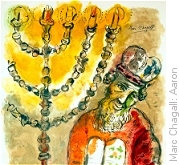
[ "Faith is the strength by which a shattered world shall emerge into the light." - Helen Keller ]
12.11.23 (Kislev 28, 5784) Chag Chanukah Sameach friends. Keep the flame within your heart burning, friend... A sage once told a person struggling with his faith: "It is written that all creation was brought into being because of people like you. God saw there would be people who would cling to our holy faith, suffering greatly because confusion and doubt would plague them. God perceived that such would overcome these doubts and troubles of heart and remain strong in their belief. It was because of this that God brought forth all creation." Indeed, it was because of this that Yeshua our LORD suffered and died for you... Amen. Therefore never yield to despair, since that leads to further darkness and fear. Press on and keep fighting the "good fight" of faith (1 Tim. 6:12). Remember that you infinitely matter to heaven; your life has great value; you are significant and you are truly loved by our Heavenly Father. There is a "future and a hope" for you; there is "a white stone, and on that stone will be written a new name that no one can understand except the one who receives it" (Rev. 2:17). May "the trial of your faith, being much more precious than of gold that perishes, though it be tested with fire, be found to result in praise and glory and honor at the revelation to come" (1 Pet. 1:7).
"I am sure of this, that he who began a good work in you will bring it to completion (ἐπιτελέω) at the Day of Yeshua the Messiah" (Phil 1:6). The LORD is able to guard you (φυλάξαι) from stumbling and to present you blameless before the presence of His glory with great joy (Jude 1:24). "The LORD upholds all who are falling and raises up all who are bowed down" (Psalm 145:14). "He will sustain you to the end, guiltless in the Day of our Yeshua the Messiah" (1 Cor. 1:8). He who calls you is forever faithful; He will surely do it (1 Thess. 5:24). Yea, "the Lord is faithful (נֶאֱמָן הוּא): He will establish you and guard you against the evil one" (2 Thess. 3:3). The Spirit says, "Fear not, for I AM with you always."
Hebrew Lesson:
Isaiah 41:10 Hebrew reading (click):
Love not the World...
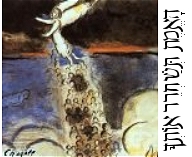
[ "You and I have need of the strongest spell that can be found to wake us from the evil enchantment of worldliness." -- C.S. Lewis ]
12.11.23 (Kislev 28, 5784) Regarding the verse, "And the earth was without form and void (תהוּ וָבהוּ), and darkness was upon the surface of the deep" (Gen. 1:2), the midrash comments: "Darkness – these are the Greeks who darkened the eyes of the Jewish nation with their evil decrees." The utter darkness of Hellenistic thought came disguised as an angel of light, as "enlightened" thinking, but whenever such humanism usurps the authority of divine revelation, the result is exile and darkness. Indeed, the very worst kind of exile is to be unaware that you are in exile, to be so blinded that you do not see that you do not see... As Yeshua said, "If the light in you is darkness, how great is the darkness!" (Matt. 6:23); and "be careful lest the light in you be darkness" (Luke 11:35). In the end, the world and its blind lusts will pass away, for it is "tohu" (תּהוּ) - confusion and unreality - but whoever does the will of God abides forever (1 John 2:15-17).
The realm of this "fallen world" -- understood in terms of the "fellowship" (κοινωνία) of darkness -- is something from which we are delivered and of which we are no longer to be enslaved. As it is written, "God has delivered us from the domain of darkness and transferred us to the kingdom of his beloved Son" (Col. 1:13). Likewise Yeshua said, "If you belonged to the world, the world would love you as its own" (John 15:19). In other words, we are "in" but not "of" this world (John 17:15), and though we physically coexist with others in this time-space, we are no longer citizens of this fallen world and its underlying value system. We are not to love this world, nor the things this world values, since doing so embraces a philosophy of life that is at war with the Father and contrary to the truth of eternity (1 John 2:16; James 4:4). The fallen world values "the flesh" and the "desire of the eyes" that is patterned according to the "arrogance of life." In other words, it is a "beauty pageant" that esteems others based on their accidental qualities instead of their inner and essential qualities. In this connection, let me quote from Henri Nouwen regarding slavery to the world and its perverse value system:
At issue here is the question: "To whom do I belong? God or to the world?"... As long as I keep running about asking: "Do you love me? Do you really love me?" I give all power to the voices of the world and put myself in bondage because the world is filled with "ifs." The world says: "Yes, I love you if you are good-looking, intelligent, and wealthy. I love you if you have a good education, a good job, and good connections. I love you if you produce much, sell much, and buy much." There are endless "ifs" hidden in the world's love. These "ifs" enslave me, since it is impossible to respond adequately to all of them. The world's love is and always will be conditional. As long as I keep looking for my true self in the world of conditional love, I will remain "hooked" to the world - trying, failing, and trying again. It is a world that fosters addictions because what it offers cannot satisfy the deepest craving of my heart." (Nouwen: Return of The Prodigal Son; p42-43)
"Love not the world, neither the things of this world" (1 John 2:15). We see then the connection between worldliness and idolatry, since idolatry essentially involves trying to find your identity, your worth, your satisfaction, and your ultimate fulfillment in the realm of the transitory and the finite rather than in God.... We are (rightly) warned against the vices of "worldliness" and are admonished to abstain from popular culture and its spurious values, but note well that worldliness extends well beyond all this, since it concerns understanding the identity and nature of the person as a whole. The fruit of worldliness is the result of being rooted in this world rather than in God's kingdom. The various desires of the human heart - even the desire for "normal things" like personal happiness in this world - may be regarded as entirely "worldly" if they are devoid of submission to God and His rule....
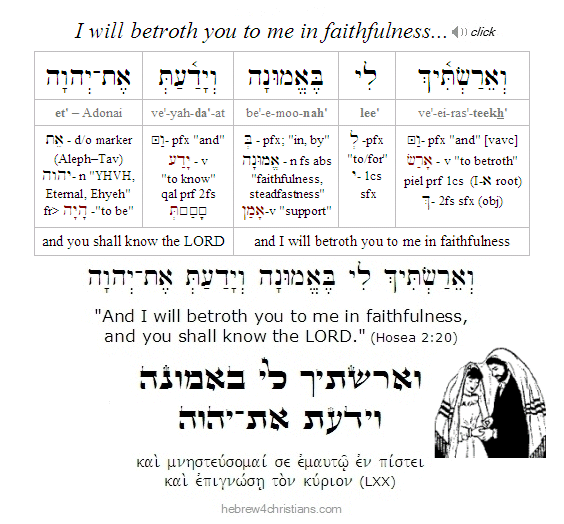 |
A principle of spiritual life is that the "inner is not the outer," and vice-versa. People are easily deceived by mere appearances, yet the eye of faith must be trained to look beyond surface phenomena to discern the underlying Reality that upholds the world. This is perhaps most evident in the case of the cross of Yeshua, which the carnal eye regards as a matter of shame and defeat, but the eye of faith regards as the very wisdom, power, and love of Almighty God Himself... Of Yeshua it is said, "he [Messiah] grew up before him like a young plant, and like a root out of dry ground; he had no form or majesty that we should look at him, and no beauty that we should desire him."
Those who rely on mere appearances will invariably find themselves confounded. The LORD therefore commissioned the prophet: "Go, and say to this people: 'Keep on hearing, but do not understand; keep on seeing, but do not perceive'" (Isa. 6:9). Where it is written, "God gave them over to their stubborn hearts, to follow their own devices" (Psalm 81:12; Rom. 1:24); and "they went backward and not forward" (Jer. 7:24), we learn there is no place of "neutrality" or studied indifference toward God... We are either going forward with Him or going backward; we are either drawing near or pulling our hearts away (Rev. 3:16).
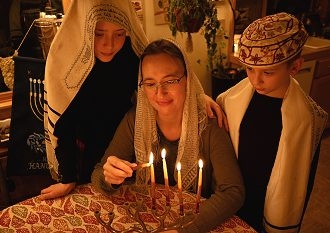 |
The Chanukah Prophecies...

12.11.23 (Kislev 28, 5784) Many Bible scholars infer that the prophet Daniel (6th Century BC) foresaw the rise of Alexander the Great centuries beforehand in the vision of a "male goat running from the west" that had a conspicuous horn between its eyes (see Dan. 8:1-12; 21-22). This goat destroyed the power of the kings of Media and Persia (symbolized by two horns on a ram, see Dan. 8:20). Though the "goat" (Alexander) became exceedingly great, eventually its horn was "broken into four [kingdoms]," and out of these four horns arose a "little horn" (i.e., the Seleucid king Antiochus "Epiphanes," c. 175-163 BC) who had authority over "the glorious land" (i.e., Israel). This "little horn" (קֶרֶן מִצְּעִירָה) greatly magnified itself, cast down some of the stars (i.e., righteous souls), took away the sacrifices, and defiled the very Sanctuary in Jerusalem. As we will see, Chanukah ultimately is a prophetic message regarding the End of Days and the victory of our Messiah...
Antiochus is perhaps most notorious for setting up an altar to Zeus over the altar of burnt offering in Temple compound and sacrificing a pig within the Sanctuary of the Temple itself. This sacrilege is otherwise known as the "abomination of desolation" (שִׁקּוּץ מְשׁמֵם) that was decreed to occur 2,300 days into Antiochus' reign (Dan. 8:13-14). Notice, however, that Daniel's prophecy has a "dual aspect" to it, and the description of the rise of the "little horn" (in Dan. 8:9-10) suggested something far more portentous than the reign of a local tyrant. This horn "grew exceedingly great toward the south, toward the east, and toward the glorious land. It grew great, even to the host of heaven. And some of the host and some of the stars it threw down to the ground and trampled on them."
In light of other New Testament scriptures, it is clear that this "exceedingly great horn" refers to future world leader (sometimes called the "Antichrist") who would one day attempt to "assimilate" all of humanity into a "New World Order" (Dan. 9:26-27, 2 Thess. 2:3; Rev. 13:7-9, etc.). It is likely that it was this sense of the "abomination that makes desolation" that Yeshua referred to in Matt. 24:15 and Mark 13:14, and it is this "abomination that makes desolation" that will be overthrown by Yeshua at the end of the Great Tribulation period (Dan. 8:23-25; Matt. 24:30; Rev. 19:11-16; 20:2, etc.).
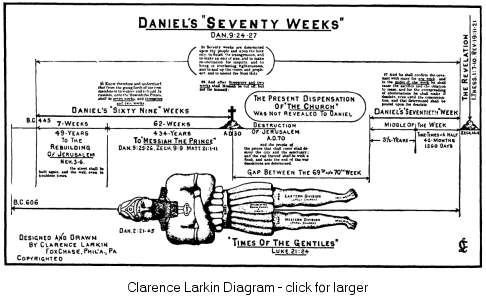 |
The intertestamental Book of Maccabees (c. 2nd Century BC) tell us more about this "little horn" and his vicious oppression of the Jewish people. Antiochus installed Hellenistic Jews to the priesthood and demanded the adherence to Hellenistic cultural ideals. He established edicts that prohibited observing the weekly Sabbath and the other biblical festivals. The reading of the Torah was outlawed and all copies of it were ordered to be burned. Temple sacrifices were forbidden; circumcision was outlawed and the penalty for disobedience was death. Women who disobeyed the edict by circumcising their sons were paraded about the city with their babies hanging at their breasts and then thrown down from the top of the city wall (2 Macc. 6:1-11). Many Jews fled and hid in the wilderness and caves and many died kiddush HaShem - as martyrs (see Heb. 11:36-39). Eventually Jewish resistance to this imposed Hellenization meant war. In 164 BC, in Modin, a small town about 17 miles from Jerusalem, Mattityahu (Matthias), a Hasmonean priest, and his five sons took refuge. When Antiochus' soldiers arrived at Modim to erect an altar to Zeus and force the sacrifice of a pig, Mattityahu and his sons rose up and killed the Syrians. They then fled to the Judean wilderness and were joined by other freedom fighters. After some organizing, they soon engaged in successful guerrilla warfare against their Syrian/Greek oppressors. The three-year campaign culminated in the cleansing and rededication of the Temple (for more on this subject, see Chanukah and Spiritual Warfare).
 |
Hebrew Lesson
Isaiah 60:1 Hebrew reading (click):
Note: For more on this subject, see "Why Christians should celebate Chanukah."
Happy Chanukah!
Parashat Miketz - מקץ
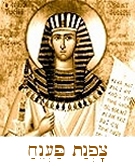
[ The eight days of Chanukah run from Thurs. Dec. 7th (i.e., Kislev 25) at evening through Thurs. Dec. 14th this year. The weekly Torah reading is not suspended for Chanukah though additional Torah readings are read for each of the days of the holiday... ]
12.10.23 (Kislev 27, 5784) In our Torah portion for Chanukah week, parashat Miketz (i.e., Gen. 41:1-44:17), we will read how imprisoned Joseph successfully interpreted Pharaoh's dreams and suddenly rose to power in Egypt. Because of a famine in the land of Canaan, however, his brothers (who had earlier betrayed him) came to Egypt in search of food. A disguised Joseph then tested his brothers to see whether they were the same people who had callously sold him into slavery, or whether they had undergone teshuvah (repentance).
The eventual revelation of Joseph and his reconciliation with his brothers is a prophetic picture of acharit ha-yamim (the "End of Days") when Israel, in Great Tribulation, will come to accept Yeshua as Israel's true deliverer. Presently, the veil is still over the eyes of the Jewish people and they collectively regard Yeshua as an "Egyptian" of sorts. In this connection, I list some of the ways that Joseph is a "type" or foreshadowing of the coming Yeshua as the Suffering Servant (see "Mashiach ben Yosef").
Hebrew Lesson
Genesis 41:1a reading (click):
The Source of Light...
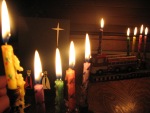
[ Chanukah begins this evening after sundown... Happy Holidays, friends! ]
12.10.23 (Kislev 27, 5784) Yeshua observed the Chanukah festival: "Now it was the Feast of Dedication (i.e., chag Chanukah) in Jerusalem, and it was winter, and Yeshua walked in the Temple, in Solomon's porch. Then the Judeans surrounded Him and said to Him, "How long do You keep us in doubt? If You are the Messiah, tell us plainly...." And Yeshua answered them: "I have told you, but you do not believe. The works that I do in My Father's name, they bear witness of Me. But you do not believe, because you are not of My sheep, as I said to you. My sheep hear My voice, and I know them, and they follow Me. And I give them eternal life, and they shall never perish; neither shall anyone snatch them out of My hand. My Father, who has given them to Me, is greater than all; and no one is able to snatch them out of My Father's hand. "I and My Father are one" (John 10:22-30).
Those of faith see the light of God. "But you are a chosen generation, a royal priesthood, a holy nation, His own special people, that you may proclaim the praises of Him who called you out of darkness into His marvelous light" (1 Pet. 2:9).
"God is Light; in Him there is no darkness at all" (1 John 1:5). Yeshua said: "I am come a light into the world, that whoever believes in me should not abide in darkness" (John 12:46). The final message of Chanukah is eschatological and full of hope. This world passes away and the Kingdom of Heaven will be established upon the earth. We live in light of this blessed hope (Titus 2:11-13). The world's rulers are "on notice" from God Almighty: their days are numbered and they will surely face the judgment of the LORD God of Israel (Psalm 2). We must stand against evil by refusing to conform to the world (Eph. 6:11-18).
Now is the time. "Let your light so shine before others that they may see your good works and give glory to your Father who is in heaven" (Matt. 5:16). Followers of Yeshua are made part of His Dwelling - extensions of His Presence in this dark world - and during this Chanukah season may we remember the call to rededicate our lives to Him! Amen.
Hebrew Lesson:
Psalm 36:9 Hebrew reading (click):
Psalm 36:9 Hebrew page (pdf)
Happy Chanukah!
The War for Truth...
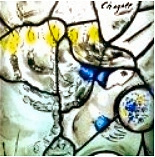
12.08.23 (Kislev 25, 5784) The holiday of Chanukah reminds us that we must remain committed to Torah truth in a godless, and therefore insane, world. After all, since reality is the "handiwork" (i.e., conscious design) of an all-powerful, all-knowing, all-loving, morally perfect, purposive, personal, and spiritual Agency who has been revealed in the Jewish Scriptures, those who deny this reality are living in a state of ongoing delusion. In a sense, the history of humanity - especially as it has been expressed philosophically and politically -- has been nothing less than the conscious design to redefine reality as something that it isn't. "The kings of the earth station themselves, and the dignitaries take counsel together against the LORD and His Messiah" (Psalm 2:1-3). Spiritual warfare is therefore the fight for sanity and truth in a world that prefers madness and self-deception.
In a prophetic sense the story of "Epihpanes" foreshadows the coming time of the "Messiah of Evil" (antichrist) who will one day attempt to "assimilate" all of humanity into a "New World Order" (Dan. 9:27, 2 Thess. 2:3; Rev. 13:7-9, etc.). At first he will appear to be a "world savior" who will broker peace for Israel and the Mideast, but after awhile, like his archetype Epiphanes, he will savagely betray the Jewish people and set up a "desolating sacrilege" in the Holy Place of the Temple (Matt. 24:15). His satanic rise will occur during acharit hayamim - the "End of Days" - otherwise called the period of the Great Tribulation (Matt. 24). The Final Victory of God will be established when Yeshua returns to destroy this Messiah of Evil at His Second Coming. The Holy Temple will then be rebuilt and dedicated by the hand of the true Mashiach of Israel.
The Gemara says that Javan, the descendant of Noah's son Japheth (Gen. 10:2), became the founding father of ancient Greece who inherited Japheth's blessing: "May God give beauty to Japheth (יַפְתְּ אֱלהִים לְיֶפֶת) and let him dwell in the tents of Shem" (Gen. 9:27). This blessing gave him the special ability to found the arts, philosophy, and science, though if these were exercised apart from the influence of Shem, that is, apart from a Torah perspective, such pursuits would ultimately become vain and even dangerous. In other words, even though "all truth is God's truth," human learning must be contextualized in light of the divine revelation. The humanistic mindset deifies knowledge and technique; it understands to believe, instead of believing to understand. For this reason, among others, the spiritual war between Zion and the secular world rages to this hour...
Hebrew Lesson
Psalm 27:1 reading (click):
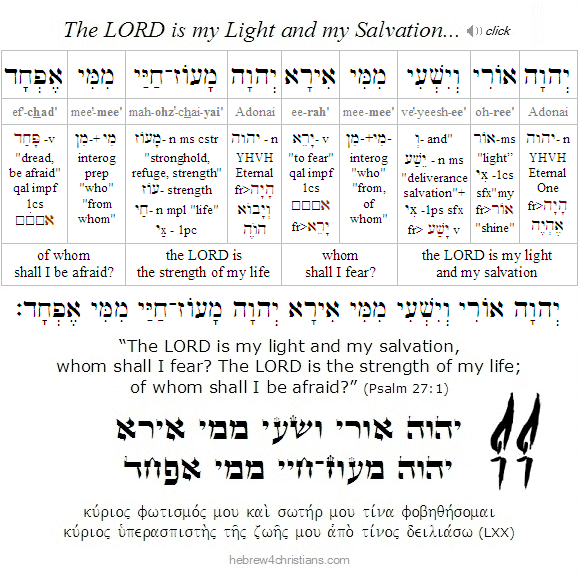 |
Note: For more on this enrty, please see "Chanukah and Spiritual Warfare."
|
























